Contents
- Introduction
- About the Illustrator
- About the Translator
- The 100 Women
- Nüwa
- Queen Mother of the West
- Sunü
- Fufei
- Momu
- Cannü, the Silkworm Girl
- The Princess of Xiang
- Chang’e
- Yaoji
- Meixi
- Daji
- Fuhao
- Baosi
- Zhinü, the Girl Weaver
- Consort Fan
- Du Sanniang
- A Woman Advisor in the Wilds of Chu
- Madam Li
- The Lady of Xi
- Consort Xia
- Nüxu
- Nie Ying
- Ruji
- Xishi
- Dongshi
- Wuyan
- Zhuang Tianshi
- Mengmu (Mother Meng)
- Zhuangzhi
- Meng Jiangnü
- Yu Meiren
- Meng Guang
- Empress Lü
- Zhuo Wenjun
- Wang Zhaojun
- Zhao Feiyan
- Ban Jieyu
- Ban Zhao
- Lady Li
- Princess Wusun
- Cai Wenji
- Ma Gu
- Jia Wu
- Luofu
- Diaochan
- Empress Zhen
- Baogu
- Madam Wei
- Green Pearl
- Xie Daoyun
- Princess Lechang
- Su Xiaoxiao
- Lady Huarui
- Zhu Yingtai
- Hua Mulan
- Princess Wencheng
- Shangguan Wan’er
- Qianniang
- Yang Guifei
- Meifei
- Madam Willow
- Gongsun Daniang
- Li Wa
- Hongxian
- Yingying and Hongniang
- Du Qiuniang
- Xue Tao
- Yu Xuanji
- Guan Panpan
- Jiao Guiying
- Nie Yinniang
- Tan Wenwan
- Han Cuipin
- She Saihua
- Mu Guiying
- Mother Yue
- Liang Hongyu
- Su Xiaomei
- Li Qingzhao
- Zhu Shuzhen
- Sun Daoxuan
- Chen Ruolan
- Shentu Xiguang
- Huang Daopo
- Empress Qi
- Empress Ma
- Du Shiniang
- Li Xiangjun
- Chen Yuanyuan
- Eighth Madam
- Qin Liangyu
- Xiangfei
- Wu Zao
- Wang Cong’er
- Zhou Xiuying
- Lin Hei’er
- Hong Xuanjiao
- Zhenfei
- Sai Jinhua
- Qiujin
- Other data
Introduction
The Chinese myth of creation centres around a figure who was part-woman, part-snake — the goddess Nuwa. It is appropriate, therefore, that she should take her place as the first character to be featured in this collection of illustrations, 100 Celebrated Chinese Women, by Lu Yanguang.
Nuwa, who is said to have fashioned China’s primeval ancestors from mud,could hardly have foreseen how the future would unfold for her creations. The society which sprang up on her divine land did not always exalt women as goddesses. For many thousands of years, women who sought influence over their own lives and those of others, were often forced to make brutal and sometimes, fatal choices.
During the early dynasties, women who rose to political power did so by seducing emperors: Meixi and Daji enchanted and dominated their emperors; and are credited with destroying empires through their wanton and barbaric self-indulgence. The precedents which they set enhance the myriad tales about the life of Yang Guifei, reputedly the most beautiful woman to have walked on Earth. Her charms brought Emperor Xuanzong to his knees, a crime for which she lost her life.
Few women voluntarily sought the peril of being an imperial concubine. For many, the battle was fought simply for some control over their own lives. In a society where Confucianism, the dominant ideology, instructed that a woman should obey her father, husband and eventually, her son; it is not surprising that a woman’s bid for freedom forms one of the more common historical and literary themes. So it is that Zhu Yingtai would rather die than marry against her will, whilst Eighth Madam was driven to an act of brutal self-mutilation and Shentu Xiguang to a series of bloody murders, all in order to fend off the advances of unwelcome suitors.
Women who broke free from social restrictions include scholars, great warriors and well-known revolutionaries. In Song Dynasty times, such heroines were epitomised by historical characters such as the military general Lady She Saihua and the ninja assassin Hongxian. This role was later filled by women like the military commander Hong Xuanjiao and the revolutionary Qiujin.
I have mentioned only a handful of the characters who appear in 100 Celebrated Chinese Women. There are many others: teachers, poets, politicians and women remembered solely for their virtuous adherence to Confucian social ethics.
Although some of the women portrayed here are fictional and the existence of others supported by little reference in historical records, many have become the focus of folk tales. Cai Zhuozhi’s commentary offers a valuable glimpse into the relevance of these women to their own and future generations.
I have attempted to reflect accurately the thoughts and opinion of the author throughout my translation. The information and dates which I have added are intended to give a greater sense of historical perspective to readers unfamiliar with the stages of China’s vast dynastic past.
The history of a nation is best told through the lives of its people. In 100 Celebrated Chinese Women, a glimpse of China’s past can be seen through the experiences, often tragic and violent, of women who have come to represent different aspects of the societies and eras in which they lived.
Kate Foster
About the Illustrator

Lu Yanguang was born in Kaiping, Guandong province in 1348. He is presently director of Guangzhou Art Gallery, vice-chairman of Guangzhou Artists’ Association and chief editor of Guangzhou Art Studies.
His published works since 1985 include Lu Yanguang’s Album of illustrations,Selected New Works of Lu Yanguang’s illustrations, Album of Lingnan Scenery and Legends,100 Chinese Women, I00 Chinese Emperors, 100 Chinese Gods, 100 Chinese Scholars and 100 Chinese Monks.
A renowned artist, Lu Yanguang started his career by drawing illustrations and cartoons. Instead of the traditional Chinese style of brush painting, each character in this collection is a combination of the old – the dynastic eras of ancient China, and the new – Lu Yanguang’s refreshingly artistic technique of xiuxiang hua (portraits in decorative style). His illustrations are characterised by a strong sense of speed and rhythm.
About the Translator
Kate Foster was born in Leeds in 1968. She graduated from the University of Durham, UK in 1992 with a Bachelor of Arts (Honours) in Chinese and Management Studies.
An avid traveller who has been to East Africa, Europe, the People’s Republic of China and Taiwan, her other interests include drama, music and literature.
Presently, she lives and works in Hong Kong.
The 100 Women
Nüwa
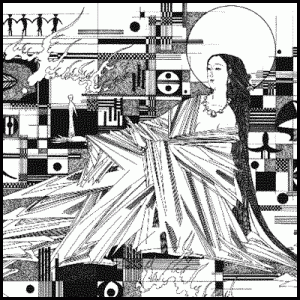
Nüwa is the goddess who separated the heaven from the earth, creating the Divine Land (China). She is the original ancestor of the Chinese nation. According to legend, Nüwa was also the younger sister of Emperor Fuxi (said to have lived during the third millennium BC) and she herself was an empress.
The historical records say:
“Nüwa had the surname Feng; she had the body of a snake, a human head and the virtue of a divine being. She is also known as Mixi.
The name Nüwa first appears in one of the Elegies of Chu entitled Tian Wen:
“If she became empress, who appointed her? If Nüwa had a form, who created her?”
Nüwa loved peace and delighted in making things. She moulded figures from the yellow earth and gave them life and the ability to bear children: this is how humanity was created. When demons fought a terrible war, they broke the pillars which held the heavens up. The firmament cracked open and the human world was put in mortal peril. To save the lives of those she had created, Nüwa worked unceasingly, melting down the five-coloured stones to mend the breach. When the firmament was whole again, Nüwa, exhausted by her toil, lay down on the earth and was transformed into a vast mountain range. In this way, she nurtured the growth of the Chinese nation by providing a rich and fertile land. This well-known tale is known as Nüwa Mends The Firmament.
Amongst China’s ethnic minorities, another story has survived concerning how Emperor Fuxi came to take his sister Nüwa as his bride. This tale is known as A Brother And Sister Marry.
The ferocious God of Thunder was captured by Fuxi’s father and imprisoned deep within a mountain cave. No one was allowed to visit him. Fuxi and Nüwa could no longer bear to hear the Thunder God’s pitiable entreaties for water, but they dared not bring him any water. Eventually, the two of them shed tears which the god drank out of their cupped hands. The Thunder God was so strengthened by the tears that he burst out of his mountain prison. To repay Fuxi and Nüwa for their part in the rescue, the Thunder God pulled a long canine tooth from his mouth and gave it to them saying:
“In three days, mankind will suffer a terrible calamity. You may use this tooth to keep yourselves safe from harm.”
Having said this, the Thunder God leaped into the sky and disappeared.
Three days later, the sky was filled with thunder and lightning. A tremendous storm broke out. Rain fell incessantly and the flood waters rose; huge waves swept across the earth and the entire human race was destroyed. As the flood began, the Thunder God’s tooth transformed itself into a boat. Safe aboard this vessel, Fuxi and his sister rode the waves and drifted with the tides. Only when the waters had subsided did Fuxi and Nüwa realise that they alone had survived the desolation. When they had grown into adults, Fuxi and Nüwa became husband and wife in order to bear descendants and establish a new human race.
This second story reflects the custom of intermarriage between blood relations in ancient China. It also shows why Nüwa is known as the mother of the Chinese nation.
Queen Mother of the West
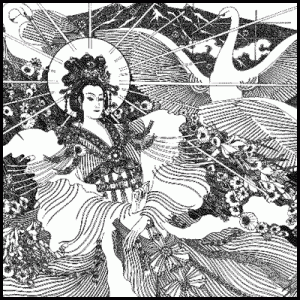
The Queen Mother of the West originally had the surname Yanghou. Her own name was Hui or Wanji and her great name was Taixu. She was probably a well-known person from Gansu or Shaanxi province. From her name, people have come to visualize her as a white-haired old crone; the old mother of all celestial maidens.
In line with this view, modern tales have portrayed her both as a majestic and an unreasonable woman. But in ancient books, she appears as an intriguing beauty and remains forever in the first flush of youth due to her discovery of the pill of immortality.
Historical annals record that the Queen Mother of the West appeared as a virtuous, compassionate and ageless beauty during the reigns of Huangdi, King Mu of the Zhou Dynasty and Emperor Wu of the Han Dynasty.
In the Eastern Sea section of The Canon of Mountains and Seas, it says: “On Snake Witch Mountain, there is someone who holds a sceptre and lives on the eastern side, although some say she lives on tortoise mountain.(1) She is the Western Queen Mother. She stands on the terrace carrying a victory staff. To her south are three green birds which gather food for her. This is to the north of Kunlun void.” The “victory staff’ is not a walking stick but a decorative ornament woven from fragrant grass. It is possible that: later generations took this staff for a walking stick and therefore conjured her to be a an old hag.
From the tomb of King Xiang of Wei, certain “records on bamboo” were excavated, including a section entitled King Mu of Zhou. It reads: “In the seventeenth year, the king travelled west to Kunlun. He saw the Queen Mother of the West that year for she was invited to the court as a distinguished palace guest .
This means that when King Mu travelled to the Kunlun mountains, he found that the Queen Mother of the West was celebrated as a local deity. On his return, he began to worship her at his Chao Palace.
In the Biographies of the Immortals, Wang Shizhen of the Ming Dynasty penned a song in her honour when she attended the feasts hosted by King Mu:
“White clouds in the sky,
The forest grows on
its own accord,
The road is endless,
Between the mountains and the water,
She who will never die,
Can still return.”
From this it can be assumed that the Queen Mother of the West was well-known. Kunlun mountains are in western China and as leader of all the celestial maidens of the western region, she was respected as a mother — the mother of all Living creatures. Perhaps the name “Queen Mother of the West” is derived from these legendary aspects.
During the reign of Han Emperor Wu ( 140-86 BC), the Queen Mother of the West boarded her chariot of purple clouds and travelled to the imperial palace with an entourage of celestial maidens, her green birds flying in front to clear the path.
Emperor Wu watched in awe and then rushed outside to greet his guests. During the feast held in her honour, she commanded her celestial maidens to sing and dance. Taking out seven flat peaches, she offered them to Emperor Wu. Having eaten one of the peaches, the emperor was about to discard the seed when the Queen Mother of the West took it from him saying: “These trees bear fruit only once every three thousand years, the peach stones are not for the world of man.” With that, she ordered her entourage to bring the seed back to Heaven.
Emperor Wu saw that she had the power to give orders to the celestial maidens and consequently believed that she must also be the dowager mother of all celestial beings.
It is also said that she was the wife of Great Emperor Yu, the Eastern Emperor, and that together, they presided over the entire Heavenly Court.
Sunü
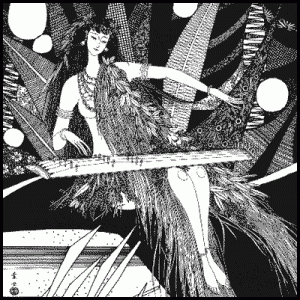
In remote antiquity, within the land surrounding Chengdu to a distance of three hundred li(1), there was once a girl who used music to benefit mankind; a celestial maiden who had power to promote prosperity and growth. This girl is also the earliest example of a female master of the qin(2) in China’s historical records.
According to legend, Sunü was Huangdi’s(3) maid and she perfected the art of the se(4.) The qins made by the Paoxi tribe had fifty strings. When Huangdi asked Sunü to play a Paoxiqin, he found the sound clamorous and discordant.
Huangdi therefore ordered Sunü to remove twenty-five strings. When she played the instrument again, the music was sweet and soothing. Huangdi commanded Sunü to reside in Chengdu and play the qin the whole year round because his cherished son, Houji, was buried in the fields surrounding Chengdu. Houji, a god of agriculture, had loved to listen to Sunü play the qin when he was alive.
Sunü plucked the qin gently, creating melodies and throughout the four seasons, the fields of Chengdu seemed to be covered with a glorious brocade; one hundred different crops sprang up unaided; water was plentiful and the grass lush; nothing withered in winter or summer and one hundred beasts lived side by side in harmony. In winter, the music from the qin would stir a warm breeze; in summer, it would summon refreshing showers. The sound of the qin transformed the region into a land worthy of the name “Land of Plenty”(5)
In Qingcheng Mountain, which is near to Chengdu, there is a place called ‘Jade Girl Cave” Legend has it that Sunü would visit this cave to rest. It is said that even today, Sunü is present in the open fields of Sichuan.
1. 1 li= 0.5 km
2. An instrument similar to the zither.
3. Huangdi, the Yellow Emperor of the Legendary Era.
4. A se is a kind of qin which has twenty-five strings.
5. “Land of Plenty” or “Tianfu zhi guo” is a traditional name for Sichuan province of which Chengdu is the capital.
Fufei
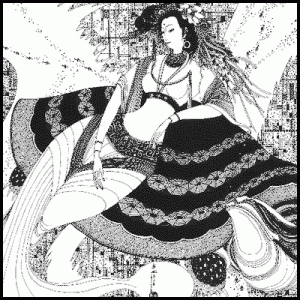
The legendary Emperor Fuxi had a daughter who was very delicate and sickly. Fragile and lonely, she was like a tender sapling swaying in the breeze. All who knew her believed that she would be a great beauty one day, yet her father paid her little attention.There were two reasons for his indifference: firstly, Fuxi had many daughters. Secondly, he preferred plump, robust women like his sister and his wife, Nuwa.
Fuxi’s daughter, free to roam in the very bosom of nature, gradually matured to womanhood with the almost imperceptible passage of time. Although she. had a pure heart to match her great beauty, Fuxi’s daughter was often melancholic.
One day, she came to the banks of the Luo River, a tributary of the Yellow River, The girl’s loveliness and sorrowful expressions intrigued the Luo River so much so that it began to woo her. Ripples appeared on the water and mist, like fine gauze, rose up from the surface and created the illusion of countless enchanting scenes. The girl saw river banks crowded with blossom trees; cliffs soaring skywards from deep, still pools; tiny rivulets like silver threads; mountainous waves, craggy peaks, gorges and long stretches of sandy beaches. Mesmerised, Fuxi’s daughter gave herself to the water’s embrace and was pulled down into its depths.
After some time, Fuxi noticed that one of his daughters was missing and went in search of her. Arriving at the Luo River, he noticed a slight ripple on the water. To his astonishment, he saw a woman of matchless beauty rise up and hover above the surface. Fixing her gaze on him, the lady gave a slight smile. Fuxi recognised her as his daughter, but only now was he aware of her flawless beauty. He chastised himself for having neglected to love her as a father should. The girl, however, could not be separated from the river. Fuxi, to make amends for his past behaviour, gave his daughter the title Luoshen, meaning Goddess Of The Luo.
When the Yellow River Deity made a tour of his domain, he met and fell in love with the Goddess and took her as a concubine, naming her Luofei or Concubine Luo. The name Luofei became Mifei because her father’s alias was Mixi.
Mifei is celebrated in Chinese literature as a woman of physical and spiritual beauty. Countless verses singing her praises have been composed, such as Sima Xiangru’s Shanglin Fu , Yang Xilong’s Ganquan Fu, Xie Lingyun’s Chenfei Fu, Li Gang’s Lianhua Fu, Song Zhiwen’s Qiulian Fu, Li Shangyin’s Dong A Wang, Wen Tingyun’s Lianhua Shi, Wang Daokun’s Luoshui Bei and Caozhi’s Luoshen Fu from which the following excerpt is taken:
“Gazing upon her from a distance;
Bright as the sun
Over rosy morning clouds.
Step nearer, look more closely,
She shimmers like a lotus
Above the waves.
Neither thick-set nor frail,
Neither tall nor short
Her shoulders seem scripted,
Her waist narrow
As if bound.
The graceful curve of her long neck
Reveals the white flesh of her throat.
There is no need for perfume here,
No need for leaden powder.”
Momu
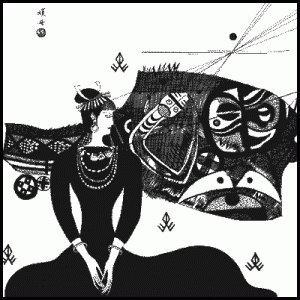
There are many women who are remembered for their extraordinary beauty, but few are celebrated for their extreme ugliness. The reputation of a beauty may last thousands of years but the same is true for an ugly lady. Momu was one exceptionally ugly woman who has been revered in Chinese literature.
Momu lived during the reign of Huangdi, the Yellow Emperor. She was born with a startling appearance: her head was shaped like a hammer, her cheekbones were high and protuberant, and her cheeks were sunken. Her eyes were tiny and triangular, her mouth too large and her overall complexion was dark. On top of these facial defects, she was hunch-backed and clubfooted. When strangers saw her, they would scurry away. Poor Momu spent most of her childhood being bullied or ignored.
Despite this cruel treatment, Momu grew up to be kind-hearted, diligent and sensible. Her sincerity, honesty and efforts to make others happy won people over gradually. Those around her began to look beyond her physical appearance and came to accept and love her. Despite her good nature, Momu still had not received any marriage enquiries by the age of twenty. People who knew her would sigh and say:
“That poor ugly girl, she’ll never find a husband. ”
One day, when Huangdi was touring his domain, he came across a group of peasant girls picking mulberry leaves. Suddenly, one of the girls cried out and fell to the ground. Her hand had been bitten by a snake. Her friends became hysterical and none knew what to do.
As the emperor watched, a young girl of hideous appearance came onto the scene. When she realised what had happened, she quickly told two of the girls to go and fetch some fresh water. Then, she gave the other girls a list of medicinal herbs and told them to find the herbs and bring them back. Tearing a strip of cloth from her skirt, she deftly made a tourniquet which she tightened around the girl’s arm. Finally, taking a hairpin from her hair, she opened up the wound, knelt over the girl, and sucked out the poison.
Huangdi told his men to see if they could be of help while he continued to observe the ugly girl. He was astonished by her courage, the way she took command and how people followed her instructions. When he enquired who she was, he was told chat she was the “ugly girl Momu”
To everyone’s surprise, Huangdi took Momu back to his palace, She was put in charge of all the palace ladies, a role which Momu performed successfully.
Huangdi always took several concubines with him whenever he toured his realm. On one of these tours, his favourite concubine, Liezu, fell ill and died. The emperor wanted to have Liezu buried and revered as an ancestor. The elaborate preparations for this ceremony were supervised by Momu. Not only was Momu able to arrange fitting sacrifices and a funeral bier, her hideous appearance was believed to keep evil spirits at bay.
Evidence of how Momu was revered can still be found today. If you look above the doorways of some peasant homes, you may well see a painting, or a mask depicting a woman of extraordinary ugliness. This is a likeness of Momu and its purpose is to ward off evil spirits.
Cannü, the Silkworm Girl
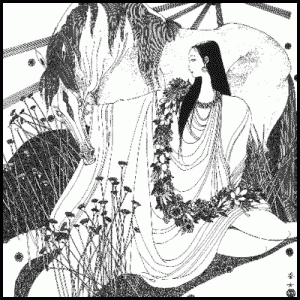
Sichuan was the seat of ancient China’s silkworm rearing region. The founding monarch of Sichuan was called Cansi, which means silk, and his greatest achievement was to teach his subjects how to rear silkworms and spin silk. However, it is not he who is revered by the people as the “Silkworm Deity”. That privilege was given to a common country girl who is known only as Cannü, which means “silkworm girl”.
According to legend, during the reign of Emperor Gaoxin, Sichuan was inhabited by many different clans. Each clan had its own territory and as there was no central leader, the region lacked a sense of unity. Conflicts often arose between rival clans.
In this turbulent region lived an attractive girl who had just reached marriageable age. Her father was abducted during one of the many battles. More than a year passed by and still, there was no word from him. The girl, with only her father’s horse to comfort her, missed him so much that she became gravely ill. Her mother, fearing that she may lose her daughter as well, made a proclamation:
“Whoever brings my daughter’s father home will have her hand in marriage!”
All the young men in the area were enamoured of this girl and, prompted by her mother’s promise, searched far and wide for her lost father. None was able to find him. Then one day, the horse struggled free of its rope and galloped off into the distance. Several days later, the animal returned, carrying the girl’s father home safely.
It was obvious that the horse had run off to look for his master and so the local people declared that the animal must have a soul. As a reward, the master gave his horse extra fodder but the horse behaved in a most peculiar manner. At first it refused to eat and drink, and then, each time the girl walked past, it would rear its body and cause a commotion. The girl’s father became suspicious and asked his daughter if she knew the reason for its strange behaviour. Unable to hide the truth, the girl told her father about her mother’s promise.
The man was outraged by what his daughter had told him and shouted:
“Who will bethroth their daughter to a beast?”
When the horse heard these angry words, it began to whine and kick. The girl’s father was furious. Snarling and gnashing his teeth, he killed the animal. When the horse had died, the animal was skinned and its hide hung in the doorway to dry in the sun.
One day, as the girl passed by the doorway, the horse’s hide rose up, enveloped the girl and carried her off to the sky. Finding his daughter gone, her father went in search of her. After searching for ten days without success, he noticed a curious object hanging in a huge mulberry tree. Stepping closer, he discovered that it was the horse’s hide, which had changed into a cocoon. Inside the cocoon was his daughter who had transformed into a silkworm.
After this, a girl was often seen riding through Sichuan on horseback. She would stop from time to time and teach the people how to raise silkworms and grow mulberry trees as these worms feed on their leaves. When asked, she would say: “Heaven has conferred this task on me so that I may never forget what it is to be just.” She is the fabled Silkworm Girl.
The Princess of Xiang
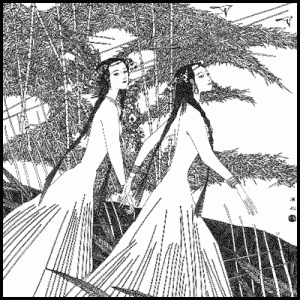
In the area where the Xiang River flows through the “Lotus Country”, there is a place called Jiuyi Shan(1) The sides of this mountain are thick with emerald green bamboo which nod and sway in the breeze. Local people have a tender affection for this plant as its spotted pattern evokes the memory of an age-old love story.
The bamboo is known as Xiangfeizhuz(2). Legend has it that the spots splashed on the stalk of the plant for eternity were the tears of the two Princesses of Xiang.
The Xiang Consorts or Princesses were E’huang and Nuying. They were the daughters of King Yao and grew up on the banks of the Xiang River, planting rice and gathering lotuses, work which they loved to do. King Yao appointed them Princesses of Xiang and they governed the Xiang River region.
Yao was a wise king. Amongst his subjects was a young man called Shun whose father was old and blind; and whose stepmother was reckless and deaf. Shun had one half-brother called Xiang, who was an idle fellow but the apple of his mother’s eye. Shun himself was a diligent and capable young man who attended to his father’s needs and kept the home in good condition. King Yao observed the fine character of this competent young man and appointed him to administer the locality. He also gave the hands of his two precious daughters to Shun in marriage.
Each day E’huang and Nuying tilled the fields and looked after Shun’s father. They also assisted their husband in his administrative duties.
Shun earned the ardent support of the people under him and King Yao made him his successor, eventually abdicating in his son-in-law’s favour. When Shun became king, E’huang became queen and Nuying was appointed concubine. Shun consulted his ladies over all matters of grave national importance and his subjects had the highest esteem for their wise council.
Unfortunately, King Shun fell ill and died in the wilds of Cangwu while on a tour of inspection. When the two sisters heard the news, they were inconsolable. Their bitter tears fell upon the bamboo and, stroking the stalks, they made a dying wish:
“May these stems forever bear the inscription of our eternal grief.”
Then, for the sake of their lost love, they threw themselves into the Xiang River and drowned.
When future generations gazed at this bamboo, they still recalled the wise and virtuous king and the two loyal Princesses of Xiang.
1. Jiuyi Shan is also known as Nine-Maze Mountain due to the presence of nine streams. It was said that the similarity of the terrain around these rivers had caused travellers much confusion, from Classical Chinese Myths.
2. Xiangfeizhu literally means “bamboo of the Xiang Consorts”; it is now translated as “mottled bamboo”.
Chang’e
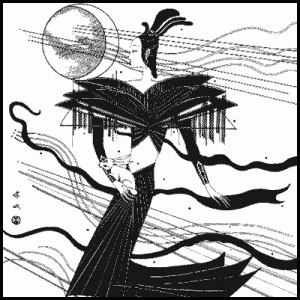
Chang’e was originally called Changxi but as the characters for “er” and “xi” had similar pronunciation in classical Chinese, later generations have confused the two. She is said to have been the daughter of Emperor Ku. As a young girl, she was already extremely beautiful, but she was also known to be taciturn, proud and aloof.
According to legend, during the reign of King Yao, ten suns appeared in the sky. The heat from these suns dried up the land, withered the plants and threatened the lives of men and beasts. King Yao had in his service, an archer of great skill named Houyi who used his bow and arrows to shoot down nine of the suns, thus saving the earth from destruction. As a result of this deed, Houyi became a hero. King Yao was prepared to reward Houyi with whatever he desired. For many years Houyi had loved Chang’e but her formidable pride and noble birth had forced him to admire her from afar. However, seeing that King Yao was sincere and would fulfil his dearest wish, Houyi plucked up courage to request for Chang’e’s hand in marriage. The king happily obliged.
After taking Chang’e as his wife, Houyi treated her like a priceless treasure, doing all he could to please her, and showered her with tender affection. Chang’e, however, treated her husband with cold indifference. The truth was that Chang’e thought herself to be the most beautiful woman on earth and firmly believed that not even the most eminent of men would be worthy of her respect.
In order to guard against the calamity of the ten suns from being repeated in history, the Queen Mother of the West gave Houyi a pill of immortality. When Chang’e learned of this priceless gift, she thought to herself:
“Surely only a divine and radiant maiden like myself deserves to be immortal!”
And so, one night, unknown to Houyi, Chang’e stole the magic pill and swallowed it down whole. Much to her surprise. no sooner had she taken the pill than she began to float upwards immediately. She drifted out of the window and up through the sky all the way to the desolate and deserted Palace Of The Moon.
To teach Chang’e a lesson, the Queen Mother of the West transformed her into a toad. This is the toad which sits in the Palace Of`The Moon and pounds the medicine for another pill of immortality with a pestle. Innumerable springs and autumns have passed since Chang’e’s flight into exile. Yet on the drifting moon, in the boundless sky, the toad, once a beautiful woman, is still pounding steadily away at the medicine which will never crumble. Spurned by gods and humans, it wearily raised its wooden pestle.
Chang’e had her wish granted; to gaze down from an exalted height for all eternity and scoff at the muddled lives of ordinary men. However, one wonders, does she now perhaps regret her former pride!
Yaoji
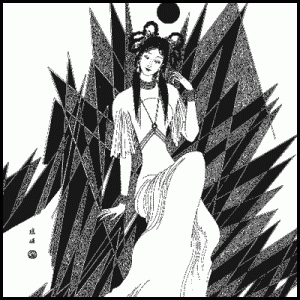
Yaoji is said to be the daughter of Chidi, a deity of South China. Her name, Yao, means Precious Jade, which in Chinese mythology would imply that she was an exquisite girl. There is a belief that those who are born beautiful are often ill-fated: Yaoji was destined never to reach old age. Following her untimely death, her body was buried in the south side of Wushan.(1)
At one time, King Huai of Chu went on a pleasure trip to the Gaotang Plateau by Yunmeng Lake (in present-day Hebei). Feeling tired, he lay down on a terrace to sleep. In his dream, he met a young girl who called herself “the woman of Wushan”. The girl recognised the heroic bearing of King Huai and, taking pity on his solitude, lay down and shared her mat and pillow with him. The two became deeply enamored with each other. When time came for them to part, the girl told the king:
“My home is on the south side of Wushan, by a craggy precipice near the peak. I am the rose-tinted cloud that you see in the morning, and the fine twilight rain. Morning and evening, I shall hover here for eternity, waiting for you.” This dream maiden was Yaoji. When King Huai awoke from this illusory joy, he felt a tragic sense of loss. Unable to forget the ethereal image, he had a temple constructed on the spot where he had slept and called it the Temple of the Morning Cloud. The prayers and sacrifices in this temple were dedicated to Yaoji.
Song Yu, a Chu man of letters, was so moved by this tale that he composed a grandiose and sentimental poem called Gao Tang Fu, which is still popular today.
The legacy and popularity of this story is clearly visible in the many idioms it spawned, such as: The Gaotang Dream , The Passion Of Clouds And Rain, Clouds And Rain Of Wushan(2). All these refer to the intimate relations between a man and a woman.
Another reference to Yaoji is made in the Song Dynasty work, The Taiping Miscellany. In this version, it is said that she was the daughter of the Queen Mother of the West and was also known as Yunhua Furen or Madam Cloud Splendour. She is reputed to have met King Yu(3) of Xia at Wushan and taught him how to control the floods which ravaged the land. Researchers were, however, unable to conclude whether these two girls were the same person. Celestial consorts of old often took delight in helping mankind and in this respect, the two girls are certainly alike.
1.Wushan or “Witch Mountain” has long been associated with various celestial maidens.
2.Indeed “Clouds and Rain” has become a synonym for love-making.
3.Yu, the great legendary founder of the Xia Dynasty, is credited with subduing the Great Flood.
Meixi
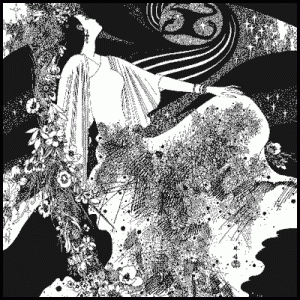
When King Jie of Xia(1) led a punitive mission into the state of Shi, the people of Shi gave him a tribute gift; a woman called Meixi. King Jie took her back with him for his harem.
It is true that the harem of King Jie housed innumerable beauties and all of them were gentle and refined in accordance with the fashion of the court. Meixi was obviously very different from these ladies. Her home, the state of Shi, was a backward and barbarous nation and Meixi had the wild and unruly nature of her homeland. Her manner was forthright and her dressing masculine. She always carried a great sabre at her waist and would come and go as she pleased. King Jie, a notorious womaniser, was attracted by Meixi’s untamed spirit and together they indulged in wanton pleasures. He pillaged his country for women of every description to add to his harem. Singers, dwarfs and jesters were gathered at the court to provide constant entertainment. King Jie even ordered that a landscape be created with a “lake of wine” and a great “forest of meat”. All these were built with Slave labour and when the lake was completed, the king and Meixi would sail around on a little boat. Court officials were ordered to throw themselves into the lake and, urged on by the beats of a drum, they would drink with great abandon. Many unfortunate subjects would drink themselves into a stupor and drown in the lake. When Meixi saw a body sinking, she would clap her hands with joy. King Jie paid little attention to the administration of his country. On the few occasions that he did attend a government session, Meixi was always at his side, giving confusing and unreasonable advice.
A revolt led by the dukes and marquises created an opportunity for King Tang to overthrow the dynasty. King Jie’s army refused to put up any resistance and was easily beaten. Meixi and King Jie were put in their tiny boat and cast into the high seas.
Black clouds enveloped them as the sky became dark and thunderous. The boat was tossed around by mountainous waves. Looking up to the heavens in remorse and despair, King Jie held on to Meixi who struggled free from his grip. Suddenly, she looked at him straight in the eye with a coldness which was quite out of her character and asked in a slow deliberate voice: “How does it feel to lose a nation?”
A huge wave crashed over the boat; Meixi was swept away. Struck by the next monstrous wave, the vessel capsized; boat and king disappeared without a trace.
1. King Jie, the legendary last emperor of the Xia Dynasty (2100-1600 BC), is said to have reigned from 1818-1766 BC.
Daji
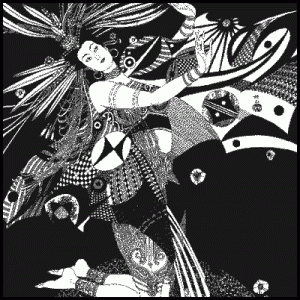
Meixi speeded the downfall of the Xia Dynasty.The Shang or Yin Dynasty(1) which succeeded the Xia was also destroyed by a legendary femme fatale, Daji (d. 1122BC). Daji was the daughter of the King of Su. When King Zhou of Yin ( 1154-1122 BC)carried out a punitive expedition on the state of Su, he received Daji as a tribute from her father.
A bewitching beauty and a shrewd woman, Daji soon became King Zhou’s favourite. According to the Biographies of Eminent Women, King Zhou indulged in merry-making and after Daji’s arrival at the court, he seldom let her stray from his side. Her influence became paramount; were she to praise a courtier, he would undoubtedly experience a meteoric rise in status and more likely than not, end up being a member of the nobility. On the other hand, those unfortunate enough to receive a word of criticism would be executed on King Zhou’s orders. These indiscriminate promotions and executions would be carried out on the spot.
The decadence of the Yin court far exceeded that of the Xia Dynasty under King Jie and Meixi. The palace would resound with music as Daji dazzled the king with dances of erotic abandon. She ordered that a “lake of wine” and a “forest of meat” be built in which men and women were commanded to wander about naked and indulge in amorous pleasures,
As the shameless excesses of the court increase the lives of the common people were plunged further into misery and suffering. The population seethed with discontentment. King Zhou, aware of his subjects dissatisfaction, invented a “roasting torture” in the hope that this would silence dissent. A large copper pole, liberally smeared with grease, was erected in the market place. A fire would be lit at the base of the pole. The unfortunate offender would then have to hug the top of the pole with a all his might to prevent himself from falling into the fire. The criminal’s hands, feet and belly would begin to burn and scorch. Finally, drained of strength and unable to endure the pain any longer, the victim would inevitably release his hold and be engulfed by the fire raging below.
Daji delighted in the “roasting torture” and would always be present to enjoy the spectacle. When each victim finally gave up and was consumed by the flames, Daji would explode with raucous laughter.
On one occasion, an uncle of the king, named Bigan, reprimanded his nephew, saying: “You heed only the words of that woman and you do nothing but damage pour reputation as a king. Take my word – disaster is bound to strike!”
Daji learned of his complaint and, with a smile on her lips, told him: “I have heard that the hearts of great sages are remarkable in that they have seven apertures.Today I have a mind to find out if that is true!” Bigan’s chest was ripped open there and then.
When King Wu of Zhou led his army against Yin, King Zhou’s forces refused to fight in his defence. Realising that the situation was beyond hope, King Zhou threw himself into a fire and burned to death.
King Wu captured Daji and decapitated her. Displaying her severed head for all to see, he stuck a white flag in it which read: “The woman who killed King Zhou!”
1. The dynastic title of the Shang Dynasty (1600-1100 BC) was changed to Yin around 1400 BC and so it is also known as the Yin Dynasty, King Zhou was the last emperor of Yin.
Fuhao
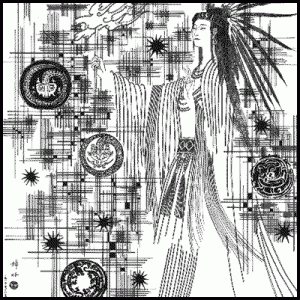
The first woman to appear in China’s written history is Fuhao, wife of Shang Dynasty sovereign Wuding (1324-1265 BC). Many bones and tortoise shell inscriptions from the Shang Dynasty bear her name; not only because she was the wife of the king, but also because she was a prominent political and military figure in her own right.
During Shang times, religious sacrifices and divination were considered essential political activities. Sacrifices were offered to Heaven, Earth and ancestors. Among other things, spirits were believed to help ensure the success of military expeditions, ward off sicknesses, keep misfortunes at bay and guard against all kinds of calamities. Religious rites were always presided over by members of the slave-owning class; the highest echelon of society. The most prominent member of this class was Fuhao, who frequently oversaw these ceremonies on behalf of the king.
A large number of the Shang Dynasty bronzes unearthed in China, including the first food vessel, were inscribed with the characters, “Fuhao”. It can be surmised that she must have occupied an exalted position during her lifetime.
Excavations of Shang ruins have also unearthed many tortoise shells which bear inscriptions, believed to be written by Fuhao herself, indicating that she had practiced divination.
During Shang times, the nation’s main concerns were si (sacrifices to the gods), and rong (military affairs).There is extensive documentation of Fuhao’s decisive role in the military campaigns of the Shang. Under orders from King Wuding, she led Shang troops against the Tu tribe in the north, the He tribe in the south-west, the south-eastern state of Yi and the state of Qiang in the north-west.
One oracle inscription reads : “Fuhao’s 3,000) gathered, and 10,000, a great expedition…” This refers to the campaign launched against the state of Qiang, in which Fuhao commanded a regular army of 3,000 and an additional force numbering 10,000 soldiers. Fuhao, therefore, rode at the head of an army of 10,000, a colossal military force at the time. Four copper battle axes engraved with her name have been recovered from her tomb in Anyang, Henan province – two big and two small. Such axes were used by the Shang to symbolise extensive military authority and power.
Fuhao was extremely wealthy. Like other great statesmen, she governed her own fiefdom and possessed a large collection of treasures: bronze ware, jade artifacts and cowrie shells; all of which were symbols of wealth and power. She also owned many slaves. Her tomb contained more than 400 bronzes, 7,000 cowrie shells and 16 human sacrifices.
King Wuding outlived Fuhao. After her death, he frequently offered sacrifices to her spirit, requesting her help in overcoming his enemies. After his death, his descendants did not place Fuhao in his tomb with his other concubines. Her grave remained apart and she was worshipped in her own right,
The Shang Dynasty’s slave society had a tradition of matrilineal and matriarchal customs which undoubtedly helped Fuhao to wield power openly. However, with the widespread acceptance of the feudal patriarchal system, women were subjected to the rule of gods, ancestors and their husbands. Apart from the few who usurped the throne, no Chinese woman, other than Fuhao, has ever played such a decisive role in state affairs.
Baosi
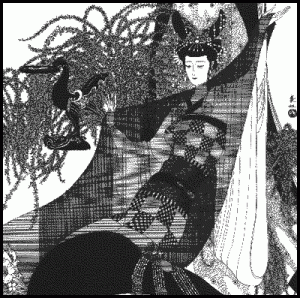
It is strange that imperial concubines were blamed for the destruction of three consecutive dynasties: the Xia, Shang and Zhou. It’s stranger that all three of these beauties came from minor states which were defeated by the kings who took them to be their concubines, the empires of which these beauties subsequently ruined.
Baosi (d. 771 BC) was the favourite of King You, the last emperor of the Western Zhou Dynasty. Because of his obsession for her, the Western Zhou Dynasty was destroyed.
The state of Bao was a small country. It sent a group of pretty slave girls to King You in an attempt to win his friendship. Amongst the slaves was Baosi. She caught the eye of the king immediately for he was fascinated by her look of cold indifference. The king’s harem was a gaggle of sycophantic ladies who would do anything to please him. In contrast, this ice maiden appeared particularly seductive. Baosi bore the king a son, Bofu. The king, overjoyed, made her his empress and her child the crown prince. His existing wife, Empress Shen, and her son, Crown Prince Yijiu, were cast out.
Baosi had ascended to the nobility in a single bound. She enjoyed a life of luxury but still she never smiled. King You tried everything he could to make her smile but to no avail. It was said that Baosi’s maids once remarked that her rare smile was unlike those of ordinary women for it contained a multitude of emotions and charms. Hearing this, King You came up with a plan. He ordered that the warning beacon be lit and the war drum sounded. Hearing the alarm, the dukes and marquises thought that enemies were invading the country. In great haste, they gathered their troops and reported to the king. Inside the city, the people remained calm, but those outside were thrown into a flurry of panic and confusion. When Baosi saw the commotion, she smiled coolly; King You was ecstatic. When the dukes and marquises came to him for instructions, the king said:
“There is no invading army, all I wanted to do was to make Baosi laugh!”
From then on, King You would light the beacon and raise the war alarm according to his whims and fancies. The noblemen would summon their troops only to be told to return home. After this had happened several times, the dukes and marquises grew weary of putting up with such ridicule and refused to respond to the king’s summons.
Not long after, the father of the deposed Empress Shen, in collusion with a minority tribe from the western regions, staged an invasion. King You raised the war cry but no one came to save him. In desperation, he fled the city with Baosi, only to be put to death at Lishan.
This foolish monarch who “lit the beacon to mock dukes and marquises” was not widely mourned. Baosi, however, emerged relatively free of guilt.
Zhinü, the Girl Weaver
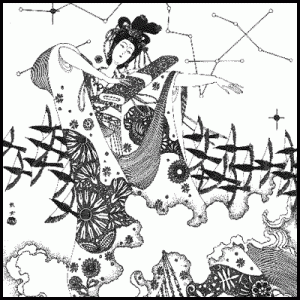
Gaze up to where the heavenly river (the Milky Way) traverses the night sky and you will see a constellation of five small stars on the east bank. This is Vega, the star of Zhinü, the Girl Weaver. Opposite her, on the distant west bank is Altair, the star of Niulang, the Cowherd, shining brilliantly through the ages – lonely, waiting.
The legend of Zhinü is the first recorded story in which a common working woman came to be symbolised as a deity. According to legend, Zhinü was the daughter of Tiandi, the Emperor of Heaven. She was envious of the blissful and harmonious life of mortals who laboured each day; men tilling the fields, women spinning and weaving cloths. As soon as she could, she descended secretly to Earth where she married the honest and industrious Niulang from the Li clan. Every day, Zhinü worked at her loom, weaving cloths of such exquisite beauty that everyone wanted to own it. After some time, Tiandi discovered that his daughter had run away from the heavenly court and he was furious. In a rage, he ordered his celestial guards to go down to Earth and bring her back. With the help of a divine ox, Niulang managed to follow his wife right up to the sky, only to find himself cut off from her by the heavenly river. Unable to cross to the east, he reluctantly admitted defeat and stayed alone on the west bank.
Back in her father’s palace, Zhinü wept constantly and grew thinner and weaker by the day. Still, her father turned a blind eye to her suffering. One day, the Queen Mother of the West saw Zhinü, like a fading blossom, standing by a window facing west, gazing steadily into the distance. On hearing the young girl’s story, the Queen Mother of the West was so moved that she wept. She went to Tiandi and pleaded on the girl’s behalf. Tiandi eventually relented and gave the lovers permission to meet, but only for one day each year.
According to the seventh day of the seventh month of the Chinese calendar, as evening approaches, thousands of magpies bearing twigs in their beaks would fly up to the heavenly river and form a bridge. From both banks, Niulang and Zhinü would rush impetuously towards each other and meet in the middle, pouring out their heartfelt feelings for each other.
“In the distance is the Cowherd star,
Across the shimmering river sits his maid.
Delicately raising her fair hand
She works with her loom.
All day long she weeps
Her tears falling like rain.
The river is clear and shallow,
How many times have they crossed
and returned?
Meeting above the water
with hearts so full of emotions
They need no words”.
Zhinü, who followed her heart, is
burdened with a bitter destiny.
Niulang can find comfort thus:
“Delicate clouds frolic,
Shooting stars tell of regret,
The silver river is remote and hazy.
Golden wind, dew of jade, they meet by chance,
A sight too lovely for the mortal world.
Emotions flow like water,
A dream-like meeting time,
The magpie bridge, the pathway back
Is a sight too cruel for words.
If our mutual love is everlasting,
Let’s not fear that we’re not together,
All day long.”
Over thousands of years, the story of the Cowherd and the Girl Weaver has been told in every household. People gaze up at the river of stars, their hearts harbouring one thought: the hope that the lovers will be reunited soon.
Consort Fan
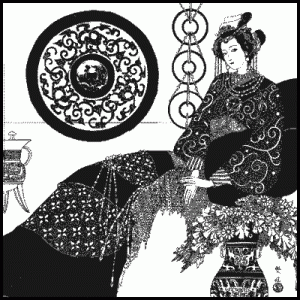
First there was Bo’le, and then “the horse that runs one thousand li.” Yet for the emperors of ancient times, if men like Bo’le were hard to find, women were even more so. The emperor’s harem was usually filled with ladies taught to smile and flatter; few would take the risk of offering straightforward and honest advice.
Consort Fan, a concubine of King Zhuang of Chu, appears in Biographies of Eminent Women in the section entitled Wise and Virtuous. Her wise counsel contributed a great deal to King Zhuang’s success as a statesman. King Zhuang was inordinately fond of hunting, often abandoning important affairs of the state to go on expeditions. Consort Fan begged him to stop but he would not listen, so the determined lady stopped eating meat. King Zhuang doted on Consort Fan. When he saw her refusing food, he began to lose interest in hunting and gradually turned his attention to matters of the state.
Within a short time, King Zhuang became so absorbed in state affairs that he frequently forgot to eat and sleep. Consort Fan noticed the king’s deep absorption in his work and sought for an opportunity to offer him some tactful advice.
As King Zhuang returned to his palace late one night, Consort Fan asked him: “Aren’t you exhausting yourself, coming home so late night after night?” King Zhuang answered contentedly: “I shall never feel weary as long as I have a wise man with whom I can discuss my affairs.” Consort Fan was surprised: “Who is this wise man'” “Yu Qiuzi!” said the king.
When Consort Fan heard the name, she laughed despite herself. King Zhuang looked at her with astonishment but she spoke up with fervour: “I have served you for eleven years and have spared no efforts to look for able men to assist you. I have even sent envoys to Zheng and Wei to enlist the wisest men to be your counsellors. Yet never have I wished to monopolise your favour as I feared that my personal considerations may distract your attention on state matters.
“Yu Qiuzi, however, has been your prime minister for a decade and all the men he has recommended to you throughout that time have been members of his own clique. Don’t you see that he is deceiving you? He is in fact, preventing wise men from coming forward to offer counsel. Where then is his loyalty? Where is his virtue?”
King Zhuang listened but hesitated to reply. He later told Yu Qiuzi of Consort Fan’s accusations. The prime minister felt so ashamed that he resigned, recommending Sun Shu’ao to take his place and assist King Zhuang in the ruling of the state.
Du Sanniang
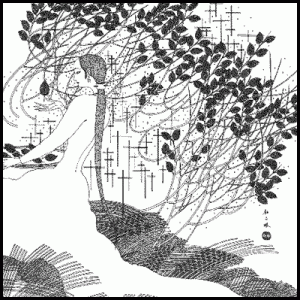
The most intelligent people are those of humble birth. Moke Huixi records a journey made by Confucius through the state of Wei which proved the truth of this saying.
During the Spring and Autumn Period, Confucius, seeking an official appointment, took Zigong and Zilu with him to the state of Chen. En route, they travelled through the state of Wei where the scenery was very pleasant. Mulberry and willow trees lined their path.
Confucius was in a happy mood and he began to recite: “The branches in the south are gentle and graceful, those in the north long …” His verses were interrupted suddenly by the song of a woman picking mulberry leaves by the side of the road. She sang: “The master travelling to Chu will certainly run out of provisions.” Confucius did not reply but began to walk with a slower step. The woman continued her song: “He will not know how to thread the bright pearl with nine holes, but he can return and ask the woman who plucks mulberry leaves.”
Confucius had no idea as to how to interpret these words, nor did he seek an explanation. Eventually he did indeed face near starvation between Cai and Chen. Confucius and his disciples arrived at Chen. The Marquis of Chen had heard that Confucius was a sage and decided to put him to the test. Taking out a pearl, he said: “This is a bright nine-hole pearl. Inside it are nine holes, on the surface only two at opposite ends. Please thread this pearl for me.” Confucius was baffled. To gain a little time, he said: “Please give me three days to think of a solution, by which time I shall certainly have threaded it.” The Marquis of Chu consented.
Returning to their lodgings, Confucius and his disciples pondered over the problem. Suddenly Confucius ordered Zigong to get his horse ready. He said: “Do you remember the woman who was gathering mulberries? She had great foresight. I am sure she knows the answer. Zigong, you must go and ask her for her advice!”
Zigong rode all day and night until he arrived at the country lane in the state of Wei. When he got to the area where the mulberries grew, there was no sign of the woman. Looking around, he could only see four mounds of mud between the trees. They were more than one chi apart from each other. Zigong asked himself what the scene could signify:
“Mulberry trees have wood, mud is earth, could it be that her surname is Du?” At her side are three more mounds, could her name be “Sanniang?” Zigong asked a woodcutter for directions. Following his instructions, Zigong found Du Sanniang.
Zigong told her about the dilemma and she laughed, saying: “It is not difficult. Just take a silk thread and tie it around an ant. Coat the thread with oil so that it is slick and smooth and then let the ant crawl through the small hole in the middle of the pearl, slowly releasing the silk thread. If the ant stops moving forward, blow a little smoke into the hole to encourage it. That is how you thread a pearl with nine holes.”
Zigong thanked Du Sanniang and rushed back to inform Confucius. Confucius followed her advice and, sure enough, was able to pass the silk thread through the pearl.
Some time later, Confucius asked Zigong: “Did you ask the woman how she came to know that we would encounter difficulties; and the problem of the nine-hole pearl'”
Zigong replied: “She should easily have known that Cai and Chen had several successive years of bad harvest. Threading the pearl with nine holes is a test which the Marquis of Chen likes to use to mock wise men. She must have heard of it.” Having listened attentively to these words, Confucius said: “The wisest people are those of lowly birth! You should never belittle women!”
A Woman Advisor in the Wilds of Chu
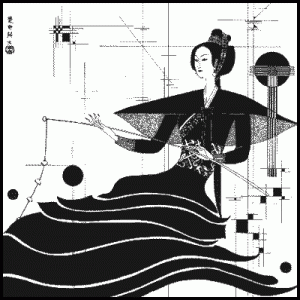
During the Spring and Autumn Period (770 – 476BC), there were more than one hundred schools of thought in China, each with its strong following. Eloquent men, adept in the art of reasoning, used their persuasive powers to advise rulers which school was the best. Many gained official titles in the process. It was not only men who used their skills to protect their country. History books record the case of A Female Advisor in the Wilds of Chu, in which a woman spoke out fearlessly and by doing so, saved her country.
Duke Jian of the state of Zheng sent one of his senior officials as an envoy to the state of Chu. As this was an urgent task, his carriage was driven as swiftly as the wind, scattering all those in its path like startled chickens. Eventually, he came to a narrow track in the Chu wilderness. Ahead of him, and travelling in the same direction, the official saw a cart driven by a woman. He spurred his horse to overtake the cart, but as he drew alongside, there was a sharp crack and his carriage came to an abrupt halt. The wheel hubs of the two vehicles were jammed together, causing the wheel axle on the official’s carriage to snap.
The official was livid. He jumped down from his carriage brandishing a horse whip, intending to flog the woman. However, she appeared quite composed. She sat quietly, frowning coldly at her would-be assailant who was cursing her at the top of his lungs and threatening to attack her with his whip. Eventually she spoke: “When a man has erred, he neither vents his anger on others nor does he find a scapegoat for his mistake. No gentlemen would ever abuse a widow. Look at the way you are behaving! Are you a gentleman? If you want to whip me, then do so! It is pitiable that a man wearing the mantle of high office should be so devoid of propriety!”
Cowed by this rebuke, the official was speechless. Blushing with shame, he meekly laid down his whip. Offering profuse apologies, he begged the woman to allow him to ride with her to the Chu capital and she consented. During the journey, the woman learnt of the official’s mission. She said: “The state of Zheng is too weak, squashed as it is between Chu and Jin. When Jin invades, you will have to sign a treaty with the enemy at your city walls. When Chu invades, you will have to sign a treaty with it too. Every year you will suffer – under Jin in winter, and Chu in summer. Yet the country does not lack the power or the means to defend itself. It is because the men who wield power in your government have loose morals and are idle. They form factions, fight and kill one another, and so cripple their country. The state of Zheng must appoint virtuous and able men who can stabilise the court, otherwise nothing you do will have any effect. You will be driven to destruction by the constant demands of Jin and Chu!”
Having said this, the woman stepped down from the cart and walked away. When the official returned home, he told Duke Jian all that the woman had said. Duke Jian saw the truth behind her words and from that day, he began to appoint worthy and loyal men to official posts. He also began to take personal charge of his court and government.
Thus a woman from Chu helped to ensure the survival of Zheng. It is said that she was a widow from the Zhao clan of Chu.
Madam Li
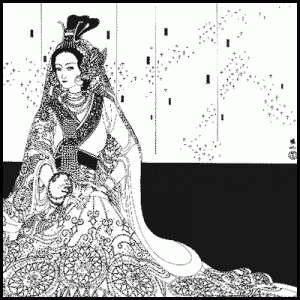
During the Spring and Autumn Period, the king of Lirong (a non-Chinese tribe) had two attractive and vivacious daughters who often helped their father with his political duties. In 672 BC, Duke Xian of Jin attacked and annexed Lirong, taking the two sisters as his concubines.
Duke Xian already had two concubines and one favourite had borne him three sons and a daughter. The eldest boy, Shensheng, had been designated crown prince. After the duke had acquired Madam Li and her younger sister, he no longer paid any attention to his former favourites. Both sisters bore the duke children. In 665 BC, Madam Li gave birth to a son, Xiqi. Her sister also bore a son, named Zhuozi. The two sisters became the duke’s favourites.
Madam Li was highly ambitious. She wanted her own son to be appointed crown prince. Hence, she and her sister bribed two of the duke’s favourite officials, Liangwu and Biwu, to help them get rid of Crown Prince Shensheng. The two courtiers fabricated slanderous rumours about the prince and ensured that they reached the ears of the duke. Duke Xian believed what he heard and consequently he despatched Shensheng to serve in Quwo. Shensheng’s allies were sent to assist him in governing Puzhou (in present-day Shaanxi). Having thus sent them away, Duke Xian kept Xiqi and Zhuozi close by his side. Shensheng proved himself to be a wise and virtuous ruler, winning great popularity among the people of Quwo. Feeling threatened by his success, Madam Li continued to collaborate with treacherous court officials, spreading malicious rumours to malign Shensheng. Duke Xian was eventually provoked into banishing his son.
Once, when Duke Xian was out hunting, Madam Li sent a letter to Shensheng. In it she said that Duke Xian had seen his former favourite, Shensheng’s dead mother, in a dream. The duke wished that Shensheng would offer sacrifices to his mother’s spirit and, after the ceremony, the sacrificial wine and meat should be sent to the duke as a tribute. Shensheng believed that the sentiments expressed in the letter were genuine and complied fully with the request. When she received the sacrificial foods, Madam Li laced them with poison. Presenting them to the duke, she told him that the food, a gift from Shensheng was poisoned. This meant that Shensheng must have sent it with the intention of murdering his father. The duke was outraged. Accused of trying to poison his own father, Shensheng committed suicide.
Just as the evil plot came to pass, Duke Xian met with a sudden and unexpected death; Madam Li and her sister had lost their protector and their shield. Before long, there was a popular uprising. Xiqi and Zhuozi were put to death by powerful courtiers. Madam Li and her sister were flogged to death by the rebels in the hall of their palace, their dreams of seeing a son enthroned were shattered.
The Lady of Xi
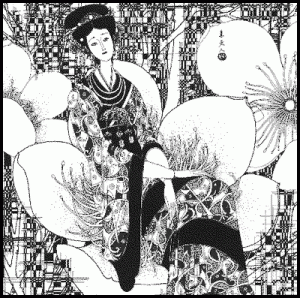
“Though born apart, may we die together.” “In heaven we shall be a pair of love birds, On earth, two branches intertwined.” These solemn vows are familiar to lovers everywhere.
Such pledges are usually associated with the fervent passion of youth. And yet, history books tell us that the first to utter these words was not a young girl extracting a promise in her lover’s embrace but rather, a middle-aged woman, a mother of two, known as the Lady of Xi.
The Lady of Xi was the wife of a marquis of Xi who lived during the Spring and Autumn Period (770 – 476 BC). When King Wen of Chu annexed the state of Xi, the marquis was imprisoned and his wife taken to the Chu palace where she was forced to become a concubine. King Wen and the Lady of Xi had two sons named Du’ao and Chengwang. Although she lived a luxurious life befitting the king’s favourite, the Lady of Xi did not utter a single word for the eight long years when she was in the Chu palace. King Wen ordered her to speak many times but the Lady resolutely maintained her silence.
One day, taking advantage of the king’s absence from the palace, the Lady of Xi finally managed to seek out her long-lost husband who had been forced into slavery. Dressed in the poorest of rags, he gazed at his wife, consort to the king, and his heart was filled with conflicting emotions. The Lady of Xi, however, spoke with uncompromising determination:
“Though we were born apart, May we be buried together.” With that, she took out a dagger and cut her throat. Her husband followed suit.
When news of the double suicide reached the king, he sighed with grief and said: “Now I understand why she would never speak a single word to me.”
To fulfil her dying wish, he had the couple buried side by side. The descendants of the Lady of Xi revered her for her great loyalty, built a temple in her memory and called it Peach Blossom Temple. This name was chosen because the Lady’s favourite flower was the peach blossom, whose beauty she was said to resemble. Thus the Lady of Xi also became known as the Lady of the Peach Blossom which reflects the delicacy of the flower, its radiance and splendour.
Consort Xia
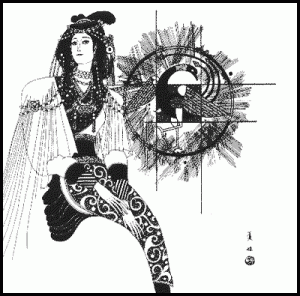
According to the annals of history, Consort Xia was the most infamous adulteress of the Spring and Autumn Period (770 – 476BC). Three times a queen, seven times married, she had love affairs with six powerful officials and countless other men.
The daughter of Duke Mu of Zheng, Consort Xia was so called because her first husband was a senior official from the state of Chen named Xia Yushu. According to legend, Consort Xia was charming, with an attractive plump figure and delicate skin. Unfortunately, many of the men with whom she had been intimate met with violent and unnatural deaths and so Consort Xia came to be looked upon as something of a bane.
When Xia Yushu was an official of the Chen court, Consort Xia had adulterous affairs with two of his colleagues, Kong Ning and Yi Xingfu. These shameless men brazenly wore robes which were gifts from Consort Xia to court and openly boasted of their amorous involvement with her. When Duke Ling of Chen heard of her reputation, he made an excuse to visit Consort Xia and also became involved with her.
One day, Duke Ling, Kong Ning and Yi Xingfu sat feasting in Xia Yushu’s home. During the revelry, Duke Ling mocked Yi Xingfu, saying: “Consort Xia’s son, Zhengshu is growing up to look a lot like you!” Xia Yushu was furious when heard this. That night, he lay in wait for Duke Ling and killed him with an arrow as he walked home. King Zhuang of Chu used this murder as an excuse to declare war and annexed the state of Chen.
King Zhuang fell victim to Consort Xia’s spell as soon as he saw her and decided to have her as his concubine. However, an official named Qu Wu protested vehemently, saying that the king’s subjects would not tolerate his involvement with such a wanton woman. Hence, King Zhuang gave up his plan. When General Zifan of Chu saw Consort Xia, he too became infatuated. Qu Wu again warned him against being involved with her.
Eventually King Zhuanfi betrothed Consort Xia to a regional official of Chu named Xianglao. When the state of Chu went to war with the state of Jin, Xianglao was sent on a military expedition. While he was away, Consort Xia had an affair with his son. Xianglao was killed in battle but his body could not be brought home for burial. King Zhuang instructed Consort Xia to return to the state of Zheng and ask her brother Duke Xiang to mediate with Jin for the return of Xianglao’s body. Consort Xia set off on her journey.
Qu Wu, who had seemed so loyal, had in fact lusted after Consort Xia since he first set eyes on her and planned to abduct her. The journey from Chu to Zheng proved a golden opportunity for him to carry out his scheme. He kidnapped her and the two disappeared without a trace. When General Zifan of Chu found out what had happened, he was so filled with bitter resentment that he killed Qu Wu’s entire family.
There are those who said that Consort Xia’s immoral behaviour should not be blamed for the misfortunes which happened; rather it was the dukes and officials whose evil intentions so often led to disaster. They should have heeded the timely advice of Xieye, an official of the state of Chen, who had warned: “When dukes and officials are immoral, what do you expect the people to do? You should restrain yourselves.”
Nüxu
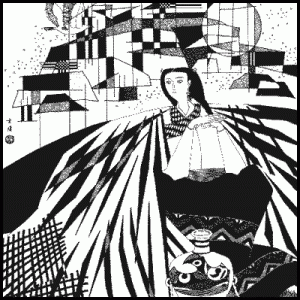
The great statesman, Qu Yuan is remembered as an imaginative, eloquent, virtuous and selfless man dedicated to his country. Nüxu, his elder sister, who was his advisor and guide, is a more obscure historical figure although her wisdom and ability were certainly not inferior to her younger brother’s.
Accordingly to legend, Qu Yuan once fled from the chaos which prevailed in the court and returned to his native village. Strolling by a mountain stream, he explained to his sister that King Huai of Chu (328 – 299BC) had heeded an unfounded slanderous report about him and consequently refused to adopt his plan to ally with the state of Qi against the state of Qin. As he was speaking, they heard the sound of a heated squabble. Looking up, they saw a group of washer-women standing by the brook, quarrelling over the large flat stones that they used for washing their laundry. Nüxu glanced at her brother and then stepped forward to investigate. Casting her eyes about, she saw a smooth flat stone, large as a reclining ox, and asked the women: “There are so few stones and so many of you. Why don’t you use this stone for your laundry!”
One of the women replied that they had attempted to move the stone nearer to the water long ago but to no avail. Nüxu thought over the matter for a moment, then said: “I shall move it for you. Come back tomorrow and you will be able to use this stone for your washing.”
After the women had gone, Qu Yuan paced around the stone three times, before regarding his sister with a quizzical expression: “Even a man would not be able to move this rock towards the water single-handedly. How are you going to do so?”
Nüxu laughed: “No one can move the rock towards the water, but I can move the water to the rock.”
Qu Yuan was a little taken aback. Nüxu said: “Let’s come back tomorrow and see what will have happened.” They walked on together.
When they returned the following day, the reclining ox stone was planted firmly in the middle of the stream just as Nüxu had said it would be. The washer-women scrambled round the sides working and chattering jubilantly. Qu Yuan walked over to have a closer look. The stone had been moved no more than two zhang (about 6.6m) from the stream, but the short distance was enough to render it useless. Nüxu had dug a hole where the stream flowed close to the stone. The force of the water and the sloping terrain had enlarged the hole so that water from the stream flowed towards, and surrounded the reclining stone.
Pointing at the stone, Nüxu said to her brother: “You want King Huai to support your plan to ally with Qi and oppose Qin to deliver our state from danger but the king will not be moved. In this, you are like the washer-women who wanted to use the reclining ox stone but discovered that it was too far from the water. It was not within the power of men to move the stone into the water, but there was another way to solve the problem – bring the water to the stone. This water is symbolic of the desires and will of the people.”
Qu Yuan understood his sister’s reasoning. In great haste, he contacted all the wise and able men of Chu and persuaded them to send petitions to the king to support his case. Flooded by their pleas, King Huai understood where public sentiment lay and sent orders that an alliance be formed with Qi against Qin.
Nie Ying
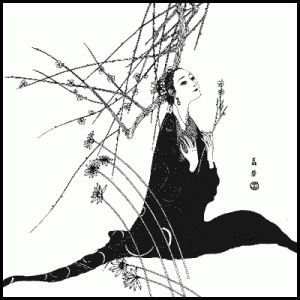
Nie Ying lived during the Warring States Era (475- 221 BC) and was the elder sister of a famous assassin named Nie Zheng. Although natives of the state of Han, they were forced to flee from their enemies. They eventually found refuge in the city of Tu in the state of Qi where they lived a secluded life with their aged mother.
Yan Sui, a minister of the state of Han, was an honest and forthright man who often came into conflict with the treacherous Han Kui and the latter finally drove Yan Sui out of the state. Yan Sui wandered from country to country, seeking a man who could kill Han Kui and save his country from ruin. When he arrived at Qi, he heard of Nie Zheng’s great courage and decided to pay him a visit. Yan Sui offered Nie Zheng two hundred pieces of gold if he would carry out the assassination, but he refused politely, saying that he was still needed at home to look after his mother. Yan Sui accepted this refusal with grace and bade Nie Zheng a courteous farewell.
Not long after, Nie Zheng’s mother fell sick and died. Having observed a suitable period of mourning, Nie Zheng began to ponder over Yan Sui’s dilemma and told his sister: “Each man has only one life and the fiery passion of youth should be offered to one’s country. I have deep respect for Yan Sui. He is honourable and honest. Now that I am no longer bound by other responsibilities, it is time that I carry out his orders.
Consequently, Nie Zheng went in search of Yan Sui who was overjoyed to hear of his change of heart.
Nie Zheng travelled to the state of Han alone and rode his horse right into the imperial palace. Han Kui was in one of the palace halls, discussing state affairs with many eminent officials. Nie Zheng galloped up to him and killed him with his sword. Then he used the same sword to slash the skin from his own face, gouge out his eyes and finally cut his throat. The palace guards carried Nie Zheng’s corpse to the town square to be displayed alongside with a notice which read:
“A reward of one thousand taels of gold to anyone who can identify this man.” The proclamation met with no response.
When Nie Ying heard of the mysterious assassin, she realised at once that it was her brother who had mutilated his face to prevent his family from suffering the consequences of his action. She travelled to the state of Han with great haste. Grieving, she embraced Nie Zheng’s corpse and cried: “This man is Nie Zheng, a native of the city of Zhi in the state of Han. I am his elder sister and I shall not, merely for the sake of my own safety, allow my younger brother to die without a name!”
Nie Ying then went on to cite the many examples of Han Kui’s treachery and praise the heroic deeds of Nie Zheng. Having finished her eulogy, she committed suicide by her brother’s side.
Thus, through the brave sacrifice of his sister, Nie Zheng’s name has been remembered up to modern times.
Ruji
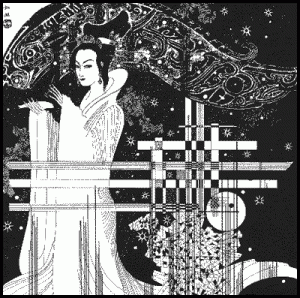
There were two women in ancient China who became famous for having stolen from their husbands. One was Chang’e who swallowed the pill of immortality and flew to the moon; the other was Ruji who stole the king’s seal. However the verdict passed by later generations on these two “female thieves” is noticeably different.
Ruji was the favourite concubine of King Anli of Wei and a close friend of the king’s younger brother, Lord Xinling.
Lord Xinling was a virtuous man and a generous host, attributes which had won him great reputation among his fellow courtiers. He saw his most important task as safeguarding the security of the state of Wei. When King Anli reached the twentieth year of his reign, Duke Zhao of Qin led a military expedition against the state of Zhao, besieging the city of Handan. Lord Xinling’s elder sister was married to Lord Pingyuan, the younger brother of King Hui of Zhao. Consequently, when Zhao sent an urgent request for assistance, the state of Wei was quick to respond. An army of one hundred thousand men, under the leadership of General Jin Bi, was despatched from Wei to the rescue of Zhao. When Duke Zhao of Qin learnt of the approaching army, he threatened the King of Wei:
“For the state of Qin to conquer Zhao is as easy as blinking the eyes. If there are dukes and princes who dare to rise in defence of Zhao, we shall use our armies to punish these offending noblemen once we have subdued Zhao!”
Frightened by the military might of Qin, King Anil hurriedly despatched an envoy with a command to recall General Jin Bi and his troops.
Lord Xinling, having sworn to die for Zhao if necessary, was placed in an awkward situation because of the king’s change of heart; he was forced to march to Zhao with only the few troops under his personal control. Before leaving, he met with the sage, Hou Ying to discuss his plans. Hou Ying told him:
“Ifyou can persuade someone to steal the king’s seal, you will be able to send an order commanding General Jin Bi to lead his troops and save Zhao. “But who would do it!” Lord Xinling asked in desperation.
“Ruji.”
The tiger seal, a stamp to signify imperial authorisation for deployment of troops, was split into two parts; one of which was in the possession of General Jin Bi, the other was concealed in the king’s bedchamber. The king’s favourite concubine, Ruji, had the freedom to enter the bedchamber whenever she pleased and therefore could easily find an opportunity to steal the seal. But would she agree to be part of the plan! Hou Ying said:
“For three years Ruji had sought for her father’s murderer in vain. When she solicited your help, you took it upon yourself to seek revenge on her behalf. This is a favour I think she will be happy to repay.
So Lord Xinling told Ruji about his plan and Ruji, out of gratitude and knowing him to be a man of integrity, agreed to steal the seal. Lord Xinling sent a messenger to collect it and forged a command from the king ordering General Jin Bi to rescue Zhao. Unfortunately, the general grew suspicious, discovered the deception and therefore, refused to carry out the order.
Ruji’s act of theft gained praise from future generations, whereas Chang’e’s theft was universally condemned. Perhaps this is because Ruji’s theft was for a noble cause.
Xishi
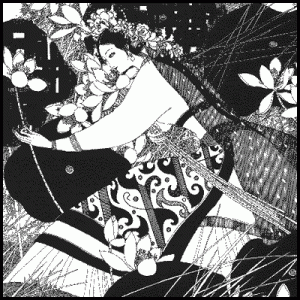
Xishi (497 BC) was a legendary beauty of ancient China. She has been described as “equally charming in both heavy and light makeup”, “as appealing when she frowns as when she smiles”. Of her figure it has been said that “were she plump, you would admire her plumpness, were she thin you would admire her for being slender”. She is celebrated as a woman of extraordinary natural beauty with a universal appeal. Although many have praised Xishi’s looks, there is but little mention of her notable virtue – she had a great love for her country and her people.
Xishi was the daughter of a tea trader from Ningluo Mountain village in the Zhuji county in Zhejiang Province. This comprised a part of the ancient state of Yue.
When the state of Yue was vanquished by the state of Wu, the King of Yue, Gou Jian was forced to serve the Prince of Wu for three years. On his release, King Gou Jian slept on brushwood and drank gall before each meal to remind himself of the humiliation his country had suffered. He commissioned men to search far and wide for a woman whom he could send as a tribute to Prince Fuchai of Wu. Xishi, whose beauty was much talked of even from early childhood, was selected for this task and sent to the capital.
King Gou Jian approved of the choice and had Xishi dressed in fine robes. He had her trained in royal court etiquette. Gou Jian ordered his minister Fan Li to take Xishi to the Prince of Wu as a tribute gift from Yue. During the journey, Xishi fell deeply in love with the wise minister. Fan Li also grew to admire this courageous lady who was willing to give her life for her country. Consequently, before they parted, they made a secret pledge of undying love.
They arrived at the capital of Wu and the prince welcomed Xishi with open arms. He was enchanted by her appearance and doted on her. Gradually he began to neglect his political duties, preferring to idle away his time with Xishi. He frequently took her out on carriage rides to the noisy and prosperous sections of the city. On these rides, he liked to boast to those around him that he had won the heart of the most beautiful woman in the world. He would add: “If you want to look at her, you’ll have to present me with some gold coins!” In this way, he also managed to enrich his coffers.
Xishi, however, never lost sight of her mission. Her aim was to bewitch the Prince of Wu so that his subjects would grow restless and his friends would desert him. The political chaos that ensued would enable the King of Yue to invade the state of Wu, recompensing him for his former humiliation.
Heaven grants the wishes of men. The King of Yue finally annexed the state of Wu. Following the death of Prince Fuchai of Wu, Xishi disappeared from public life. She lived in relative obscurity with Fan Li who became a successful trader.
This story is unique in the history of feudal China as no one has ever found fault with Xishi, even though she had caused the downfall of the state of Wu.
Dongshi
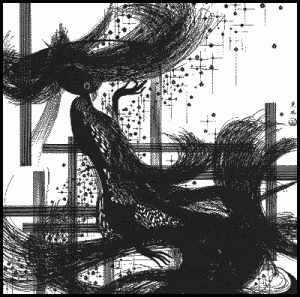
Sometimes nature has a cruel sense of humour. The village at Ningluo Mountain was home to the unrivalled beauty, Xishi. Her neighbour to the east was a girl of unparalleled ugliness, named Dongshi.
In all fairness, Dongshi’s ugliness was not in the same category as Momu’s. Rather, she was uncommonly plain. To make matters worse, she spent all her time by Xishi’s side, imitating her every move.
A story about her, recorded in Zhuangzi, never fails to raise a smile:
Whenever Xishi was worried or angry, she would put her hand to her heart and frown; an innocent gesture which would arouse feelings of affectionate sympathy in all who saw her.
Dongshi would try to imitate this endearing gesture. Feigning sorrow, she would raise her hand to her heart and knit her eyebrows. But when Dongshi did this, her queer appearance was enough to scare the villagers out of their wits. It is said that when people from wealthy families saw her, they would rush back to their houses, bolt their doors and would not venture out again. When poor people saw her, they would gather their families and run as far away as they could.
When she looked at people, they would run away and poor Dongshi never understood why. Dongshi was only aware of how attractive Xishi looked when she frowned, but she never stopped to think why people found Xishi’s look of distress so appealing.
What Dongshi failed to realise is that only what is natural is beautiful. Today, the phrase “Dongshi knitting her eyebrows” is used to refer to the ugliness and absurdity of crude imitation.
Wuyan
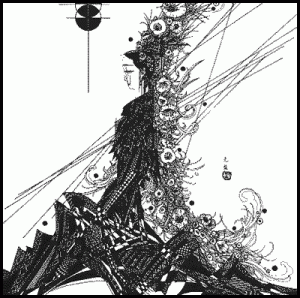
China’s historical annals bear witness to the existence of a wise and virtuous woman of startling appearance who lived long after Momu. Her surname was Zhongli, her first name Chun, yet later generations named her after her town of origin, Wuyan, in the state of Qi.
Wuyan was thin and dark. She walked with a stoop, her long arms out of proportion with her stumpy legs. Her scrawny neck, with its large Adam’s apple, supported an oval head with sunken cheekbones, a low forehead and flat upturned nose. Large teeth protruded fiercely from her mouth. Although she was more than thirty years old, she was still not married.
At that time, King Xuan of Qi was involved in a grand plan to build a great palace to be used for dancing and singing. The palace was being built with forced labour, and girls were rounded up to be trained to sing and dance. The king paid no regard to the distress of his people over such a plan.
The king’s messenger, searching through Wuyan for potential palace ladies, found that all the women had either fled from town or gone into hiding. Only Wuyan remained and she readily offered to go to the capital and serve the king. The messenger was, however, reluctant to take her, fearing that her extraordinary appearance would frighten King Xuan to death. Wuyan calmed his fear: “I have made myself up to look like this, it is only a disguise. Take me to the king and I shall show him what I am really worth.
As he could find no one else, he had no choice but to believe Wuyan and take her back to the capital with him.
When King Xuan first set eyes on Wuyan, he almost jumped out of his skin: “I told you to choose beauties, not ugly ones!”
The messenger knelt down: “Your Majesty, this woman told me she has the ability to change her appearance and this is just one of the forms she assumes.” King Xuan was intrigued : “Let’s see how you can change.” Wuyan replied: “Great king, please listen to me first. When I have finished, you will see how I have changed; perhaps you too will have changed.
Then Wuyan began to spell out all the maladies which afflicted the state of Qi, indicating clearly the terrible consequences that could befall a bad government. As King Xuan listened, he broke out in cold sweat. Having listened a little longer, he began to see that Wuyan was not that repulsive after all, in fact she became quite pleasing to his eyes.
The king no longer looked at Wuyan as “an inferior person brought to make up the numbers”, but a woman whose advice, though harsh, was just and good. He immediately ordered that work on the palace and the search for girls be stopped. He took charge of his government, ready to welcome criticisms and turned a deaf ear to slander. The king felt that Wuyan would be able to contribute a great deal to the future of his nation and so he made her empress. These events, told far and wide, became a popular tale.
In modern times, describing a girl as “Momu Wuyan” is seen as derisive, showing the superficial understanding of these characters. Although ugly, both women became celebrated as mothers of their countries. The saying should therefore be viewed as a compliment.
Zhuang Tianshi
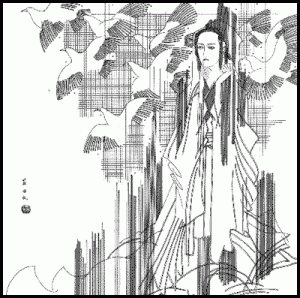
To be a wife is difficult, to be the wife of a philosopher doubly so. The reason for this is that philosophers often adopt attitudes which may not be practical. In ancient China, their thought was often based on the concept of “me alone” and “have no faith in others”. This lack of trust could cause a great deal of harm.
Zhuangzhou was the quintessential Taoist philosopher who lived during the Warring States Era (475-221 BC). His philosophy further mystified the concepts of “man” and “self’. As for his opinion of his wife, that may be judged from the tale below.
One day, as Zhuangzhou was taking a stroll, he came across a woman fanning a fresh grave-mound vigorously. He learned that the woman was recently widowed and was desperate to remarry. As her late husband’s grave was not totally dry, she feared that she would be the object of ridicule. Therefore she was attempting to speed up the drying of the earth. Zhuangzhou thought about this matter for a long time.
When he returned home, he told his wife, Zhuang Tianshi, of all that he had seen, adding: “When one’s alive, everyone speaks of their profound love, after death everyone wants to fan your grave. Having said this, he stared at his wife, examining her closely. Zhuang Tianshi loved and respected her husband. She showed him great consideration and was used to his volatile disposition. It did not occur to her that he was suspicious of her love for him.
The following day, Zhuangzhou suddenly died. He had used a Taoist technique called “using the qi to fake death” but Zhuang Tianshi was unaware of this and believed that tragedy had struck. She cried herself into a stupor and managed to arrange a fitting burial.
Zhuangzhou was known far and wide and many people came to pay their last respects. One day, a rowdy debonair man arrived.He was also a Taoist and saw at once that Zhuangthou had faked his own death. He said to Zhuang Tianshi: “All he needs is a set of brains and fresh air, then he will come back from the dead.
She went down on her knees and begged for his help. The man continued: “I can certainly revive Zhuangzhou, but you must thank me with your body. Zhuang Tianshi was so agitated that she barely heard his words as she grabbed an axe. With a few blows, she managed to break open the lid of the coffin. Her intention was to open the coffin for ventilation and then commit suicide to give her brains to Zhuangzhou.
When she lifted the lid, Zhuangzhou sat bolt upright. Inside the coffin, he had listened intently to the muffled conversation but only picked up the phrases “brains” and “thank me with your body”. Seeing Zhuang Tianshi standing over him with the axe and a strange man beside her, he flew into a fury: “You’re striking the lid of my coffin with an axe. You can’t wait to fan my grave!”
Zhuang Tianshi did all she could to make him understand but he dismissed her words as excuses. Zhuang Tianshi cried endlessly. The more she thought about it, the more she knew that she had been grossly wronged. Unable to go on with life, she hanged herself.
After Zhuang Tianshi’s death, people came to pay their respects and found Zhuangzhou sitting in a corner of the room, beating a drum and singing to demonstrate his enlightenment!
Mengmu (Mother Meng)
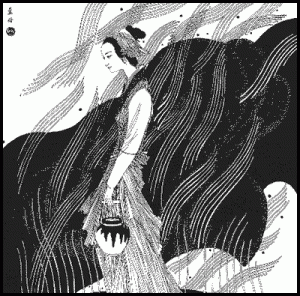
Meng Ke’s scholarly attainments and virtue won him the respect of the people. They revered him as a sage and called him Mengzi. His mother, Mengmu, was his first teacher.
When Mengzi was a young boy, his family lived next to a graveyard. Together with the other neighbourhood children, he would play games imitating the ceremonial and burial rites they often saw. Mengmu grew anxious when she saw this and moved to another house next to the marketplace. There Mengzi began to observe the merchants; bartering and trading, cunning men who haggled over every ounce, and he began to mimic them in his play. Mengmu found this behaviour equally inappropriate and so moved house once again, this time taking up residence close to a private school. When Mengzi heard the clear voices of the eager students reciting their lessons, he too, wanted to study. Only then was his mother content to settle down. This story is known as “Mengmu moved house three times”.
During his youth, Mengzi attended the private school. He played truant on one occasion. Mengmu was busy weaving cloth when she saw her son sneaking home. She called him over, took hold of the piece of finished cloth and cut it into half. She said: “If you fail to complete your studies, you will be like this severed strip of cloth – fit for nothing!”
Mengzi felt deeply ashamed, and eventually grew up to be a learned man. This is the story of how Mengmu “used her wits to teach her son a lesson”. The next story took place after Mengzi had already established his reputation.
One day, his wife went into an inner room to change her clothes. Without thinking, Mengzi barged into the room and saw his wife in a state of undress. He was intensely displeased, so he decided to send her back to her parents in disgrace. When Mengmu heard this, she chided her son: “You didn’t knock, nor did you request permission to enter, you just barged into the room! It is your fault. How can you falsely accuse your wife?”
Mengzi realised that he was in the wrong, so he apologised to his wife and implored her to stay. This is the story of how Mengmu “lectured her son in an inner room.”
When Mengzi was a minister of the state of Qi, he was frustrated as he found it difficult to use and develop his abilities to the fullest. He wanted to make the long trip back to his native home where he could find fulfillment. At the same time, he was concerned that his mother, by then old and infirm, would not be able to weather the arduous journey.
Mengmu told her son: “The Book of Changes tells us that women must manage the household and should not dabble in the affairs of the world. It also says that women must abide by the “Three Obediences and Four Virtues”: When they are young, they must obey their parents; when they marry, they must obey their husbands and when they are old, they must obey their sons. You have a great future before you and you must be bold to seize opportunities which come by! You must not be held back by your concern for me. I can still follow you wherever you go!” This story is known as “Mengmu exhorts the Three Obediences and Four Virtues”. Mengmu was a virtuous mother – the above stories indeed merit deep contemplation.
Zhuangzhi
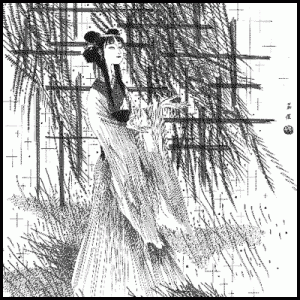
During the later part of the Warring States Era (475-221 BC), King Qingxiang ruled over the state of Chu. Under his control, the state suffered a terrible decline in fortune, yet the king still lived a leisurely life. He came and went as he pleased, constantly surrounded by a swarm of fawning sycophants, whilst loyal virtuous men such as Qu Yuan suffered demotion and exile. The state of Qin sent an envoy, Zhang Yi, to Chu. His mission was to persuade King Qingxiang to take a pleasure trip some 500 li to the south. Qin hoped to take advantage of his absence to destroy Chu.
King Qingxiang, completely oblivious to the impending danger, was full of enthusiasm and set off for the trip. Reaching the southern outskirts of the city, King Qingxiang and his men suddenly came across a small banner planted in the road. A young girl knelt and pleaded for an audience with the king. King Qingxiang was intrigued by her request for an audience and had her summoned to him. The girl was still a child, no more than twelve years old, yet she had an air of seriousness about her. She said to him: “I have a secret to tell you. There is a ‘great fish without water’ and a ‘dragon with no tail’. The walls crumble and are about to collapse, yet the king himself does not know. King Qingxiang had to admit that he did not know what she was referring to.
The girl proceeded to explain: “The ‘great fish without water’ is the king who will travel 500 li to the south for pleasure. While he is there, he will suffer a swift and great calamity: he will lose his hold on power and will have no way to regain his position, like a fish out of water. ‘A dragon with no tail’ refers to a great king who has seen the passing of forty springs and autumns but still has not appointed an heir to the throne. A country without a crown prince, without good and loyal men, is one which courts disaster. As the king is unaware ofthis, all I can say is that the walls crumble and are about to collapse, yet the king does not know.
King Qingxiang was astonished and immediately asked what calamity she was referring to, whereupon the girl told him of the evil schemes of the state of Qin. She then went on to list the five ills which plagued the state of Chu: “The first ill is that magnificent palaces are being built everywhere. The second is that costly brocades hang on the walls of these palaces while the common people do not have clothes of even the roughest cotton to wear. The third ill is that the court is opulent and extravagant; the might of the nation is on the decline. The fourth is that the people suffer thirst and starvation while the wealthy ensure that even their horses have more food than they can eat. The fifth and final ill is that corrupt officials guide the king while virtuous men are denied opportunities to offer their advice. Burdened by these five problems, disaster will strike our country.
King Qingxiang finally began to realise the truth after listening to her. He immediately ordered his troops to turn back and return to court but the city gates were blocked for the defending army had already started fighting. Before the rebel forces could have a chance to establish a foothold, King Qingxiang attacked the city with his remaining troops and only with great difficulty was he able to regain the capital.
King Qingxiang learned much from this bitter experience. He was indebted to the young girl for her criticism and was so impressed with her that he made her a lady.
The girl was Zhuangzhi. The daughter of a minor official, she had heard about the affairs of the state from her father and his friends. From their daily conversations, she came to know all about the Chu government and to understand the dangers confronting the country should the king go on a long journey to the south. Consequently, Zhuangzhi resolved to dissuade the king from going on the trip. She told her mother of her plan but her mother became anxious: “My daughter, you are only a child. Is it safe for you to remonstrate against your elders!” But Zhuangzhi had no thought for her own safety and was more determined than ever to make a petition to King Qingxiang.
After being appointed to nobility, Zhuangzhi was frequently at the king’s side “preaching frugality and love for the people” and offering ideas which King Qingxiang often accepted. Consequently, during this time, the state of Chu began to enjoy a change of fortune.
Meng Jiangnü
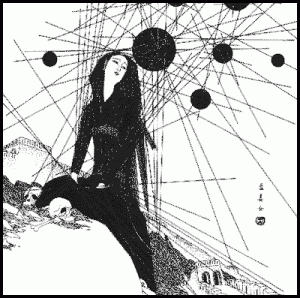
This is a solemn and tragic tale familiar to people all over China.
During the Qin Dynasty (221-207 BC) there lived a youth named Fan Qiliang, who had been conscripted to build the Great Wall. Unable to endure the back-breaking labour, he ran away.
One day, Fan Qiliang scrambled up a tree and entered the backyard of landowner Mengchao. He inadvertently met with the landowner’s daughter, Meng Jiangnü.
The two young people felt strongly attracted to each other. Meng Jiangnü boldly revealed her innermost emotions but Fan Qiliang was more cautious: “How can I, an escaped criminal, think of marrying you who have grown up delicate and refined within the shelter of these luxurious courtyards!”
In response, Meng Jiangnü vowed her undying devotion and brought Fan Qiliang to see her father, who, after some persuasion, consented to the match.
A few days after the marriage, Fan Qiliang was captured and sent back to the Great Wall. The lonely Meng Jiangnii gazed out of her window and longed for the return ofher husband. Winter arrived without any news of him. Meng Jiangnü thought to herself: “I have made you these warm clothes but there is no one to bring them to you. I will go myself.”
When Meng Jiangnü arrived at the Great Wall, she searched high and low, asking everyone she met if they knew her husband. She soon learnt that the harsh conditions had killed him some time back, and that his corpse was buried within the Great Wall. Grief-stricken and exhausted, Meng Jiangnü fell to her knees and wept.
Meng Jiangnü cried for many days and nights. Then suddenly a huge section of the Great Wall collapsed, revealing the bones of thousands of men. Without ceasing her bitter lamentation, Meng Jiangnü bit her fingers until they bled. One by one she let the drops of her blood fall on the bones until, finally, one of the drops was soaked up thirstily. That was how she knew where her husband’s remains were.
After Meng Jiangnü had given her husband a proper burial, she threw herself into the Zi River and drowned. Her story has come to symbolise the sufferings of those who are forced to live under the rule of tyrants and despots.
This tale first appeared during the Tang Dynasty, but is set during the reign of the self-styled “First Emperor to Unify China”, Qin Shihuang of the Qin Dynasty, a merciless tyrant who ordered the construction of the Great Wall, using slave labour from all over China.
Yu Meiren
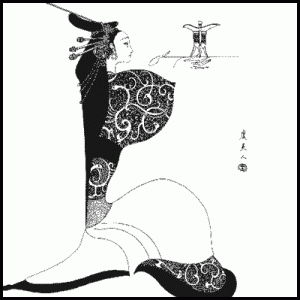
It was late in the evening of a cool autumn night. In the surrounding darkness, men raised their voices, singing songs of Chu. The air resounded with music. Xiang Yu the Conqueror, sat huddled in his heavy cloak. He inclined his head and listened intently to the familiar melodies.
“To think that so many of my noble warriors of Chu are now in the Han camp! ” He thought of his army of three thousand soldiers who had followed him from their homeland east of the Jiangdong. He remembered the night when they vanquished the Qin, killing more than one hundred thousand enemy soldiers. And now he recalled the great fire in A’fang Palace, the feasting and drinking at Swan Gate…
“Don’t think of these things!”
He angrily gulped down a cup of wine;
“I cannot return to the east defeated!”
Xiang Yu the Conqueror, sprang to his feet, his hand on his sword. Another image flashed across his mind – his beloved concubine, Yu Meiren (d. AD 202) who was always at his side, as loyal as his black mare. Dejected, he slumped back, still clutching the hilt of his sword. The songs from Chu permeated the night air.
“Very well, I shall sing too!”
He raised his voice to the chorus of soldiers, invisible in the gloom:
“With my strength I have uprooted mountains,
With my spirit, I have conquered the world.
But time is against me now,
My horse can no longer gallop.
My horse cannot break through,
Is there no way out!
Oh Yul Oh Yul
What will be your fate!”
For a moment, the rich alto voice of a woman rose and mingled with the voices of the men:
“The Han army has seized my homeland;
All around I hear the songs of Chu.
The spirit of my king is broken,
And I, a lowly concubine
Can no longer find the will to live.”
The tall and graceful shadow of a beautiful lady brushed past. Soft, supple hands gently prised apart the coarse calloused fingers which gripped the sword; they trembled slightly, searching for the hilt, and then suddenly grasped it tightly. There was a swish as the weapon was drawn from its scabbard, and a chilling glint of metal flashed in the moonlight. In a moment, the sword fell to the ground, the blade smeared with warm fresh blood.
Xiang Yu the Conqueror cried out: “Yu Meiren…”
His voice was hoarse with grief. Dramatic to the last, she had given her answer to his despair.
Meng Guang
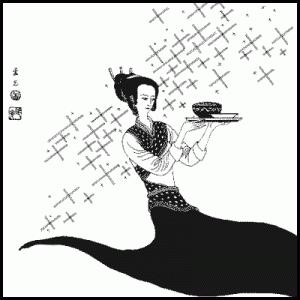
For thousands of years, Meng Guang has been considered to be the paragon of wifely virtue; a woman of plain appearance but with great moral integrity.
During the Later Han Dynasty (AD 947-950) there lived in Pingling County, a learned and capable scholar called Liang Hong, styled Boluan. Liang Hong was a man who embraced poverty and shunned official appointments, and was greatly admired by all his neighbours. Local families regularly offered their daughters to him in marriage but he refused to consider their proposals.
It so happened that in the same district, lived a girl named Meng Guang, styled Deyao. The daughter of a country squire, Meng Guang was a homely girl. Nevertheless, she had strict ideas about what she wanted in a husband. Consequently, at the age of thirty, she remained unwed.One day her father, in exasperation, asked her who her ideal man would be. Her answer was simple: “I want to marry a man like Liang Hong.”
When news of this reached Liang Hong, he replied: “Well, let her marry me!”
The time for the wedding arrived and Meng Guang travelled to his home in her finest clothes. For seven days and seven nights, he showed no interest in his new bride. No longer able to endure his indifference, Meng Guang knelt before him and asked:
“I have heard that you are a person of great moral character who has taken a long time to marry. Well, so have I. Now that you here married me, please tell me what it is about me that offends you.”
Liang Hong replied:
“Your expensive clothes and heavy makeup disgust me! The only woman I would be willing to share my life with would be one who wears only a thorn hairpin and a plain cotton dress!”‘
It was then that Meng Guang understood everything. She put on a coarse cotton dress, discarded her makeup, bound up her hair and did all the menial and laborious tasks. Only then was her husband satisfied.
Some time later, the couple went to live in the mountains of Baling. They passed their days by growing crops, playing the qin, singing and studying.
After this, they travelled all over the country, earning their livelihood wherever they went. During this time, Liang Hong worked as a thresher. Every evening, when he returned home, Meng Guang would place the food she had prepared on a tray. She would then offer this tray to him by raising it to the level of her eyebrows to symbolise her deep love and respect for her husband.
To this day, the phrase “holding the tray level with the eyebrows” is used to characterise married couples who treat each other with love and respect.
Empress Lü
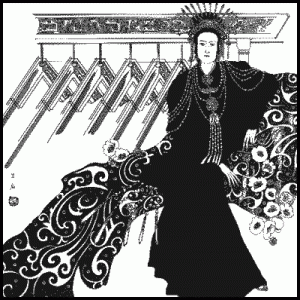
There are those who lust for power and court applause, who are unprepared to exercise authority only from behind the screen. One such woman was Empress Lü (d. 180 BC) who made an impact on the political arena of the Western Han Dynasty (206 BC-AD 24)
Empress Lü was the wife of Han Emperor Gaozu, named Liu Bang. She was a headstrong woman and assisted her husband in all his governmental decisions. Following the emperor’s death, Huidi ascended to the throne but real power lay with Empress Lü. When Huidi died, Empress Lü seized the reins of government. She was the first woman to step from behind the screen and don the mantels of power, establishing a precedent which would later be followed by Empress Wu and the Empress Dowager.
The daughter of a vagrant Han from Shaanxi, Empress Lü was originally named Zhi E’xu. Her father met Liu Bang when Liu Bang was still a minor official. Sensing the young man’s enormous potential, he immediately arranged a marriage between Liu Bang and his daughter. When Liu Bang became Emperor Gaozu, he made his father-in-law Marquis of Linsi.
Having usurped power, Liu Bang set about murdering top officials and expelling foreign minorities with the enthusiastic assistance of Empress Lü. “When the rabbits have all been destroyed, one no longer needs the dog; when the crows have fled, get rid of the archer; when enemy states have all been crushed, illustrious ministers should be killed.” Together, they exterminated all those within the court who could pose a threat to their dominance.
When Liu Bang became king, he took another wife named Lady Qi. She bore him a son named Ruyi. Because Liu Bang loved Lady Qi dearly, Empress Lü became very resentful, especially when Lady Qi requested that Ruyi be made crown prince. Born with a brutal character and a vengeful heart, Empress Lü poisoned Ruyi as soon as Huidi succeeded to the throne. Lady Qi’s fate was far worse than that of her son: Empress Lü cut off her hands and feet, gouged out her eyes, gave her a potion which made her mute, shut her up inside a toilet and assailed her ears with shouts of “human pig”.
Even Huidi, her own son, was outraged by such vicious torture. He expressed the sentiments of all those around him when he said: “Can it be a human being who does such despicable things!”
Enraged by the monstrosities committed by Empress Lü and longing for a peaceful nation, the common people rebelled. Eventually, they triumphed and the Lü dan was massacred.
Zhuo Wenjun
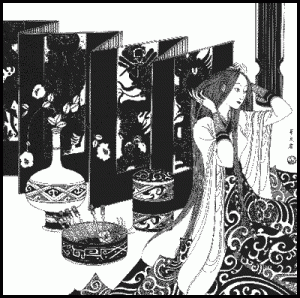
Early in his career, the great prose poet, Sima Xiangru of the Western Han Dynasty (206 BC-AD 24 ) found himself in the service of Emperor Jing (156-140 BC). Unable to fulfill his literary ambitions, Sima Xiangru resigned from his post and returned to his native home of Linqiong (present-day Ya’an) in Sichuan province.
On one occasion, he attended a banquet hosted by one of Sichuan’s wealthiest and most powerful men, Zhuo Wangsun. Wangsun had a daughter named Wenhou alias Wenjun (150-115 BC) who had been divorced at the age of seventeen. Zhuo Wenjun was fascinated by Sima Xiangru’s renowned literary talent. To satisfy her curiosity, she peeped at him from behind a screen during the banquet. Sima Xiangru had long been interested in her. Although he pretended to be unaware of her presence, he took the opportunity to woo her by singing “the Male Phoenix Pleads with the Female Phoenix” when he was asked to play the qin.
Sima Xiangru and Zhuo Wenjun lost their hearts to each other and decided to elope together that very night. Zhuo Wenjun’s father was enraged by her immoral conduct and refused to give her any money. As Sima Xiangru was also penniless, they were left destitute. They sold the few possessions they had and returned to Linqiong where they opened a small wine shop. Each day, Zhuo Wenjun sold wine in the shop while Sima Xiangru hired himself out as an odd-job man. Eventually Zhuo Wangsun was moved by the devotion his daughter and her husband showed for each other; and took pity on them. He gave them a fortune in silver and one hundred servants.
Thus Sima Xiangru became a wealthy man and, in time, even gained imperial favour. He became the favourite court poet of Han Emperor Wu (140-86 BC). As a man of exalted social status, Sima Xiangru decided it was right that he should visit prostitutes and keep a concubine, paying no heed to the objections of his wife.
Zhuo Wenjun wrote the following verse, A Song Of White Hair, to plead with and admonish her faithless husband:
“I am pure and white as the mountain snow,
Clear and bright as the moon amidst the clouds.
Yet I hear that you have two desires,
The conflict is forcing us
to a parting of ways.
Today we make our vows in wine,
Tomorrow, at dawn
I shall walk by the canal
As the water flows from east to west.
Wretched, alone.
Marriage should not bring so many tears.
I wished for a man
With a single heart,
That we should not part
When our hair turned white,
Not a bamboo rod,
Swayed by the tail
Of any wriggling fish.
A man with a steady will
Cannot be had for money.
This poem has shamed many men guilty of similar heartless betrayals.
Wang Zhaojun
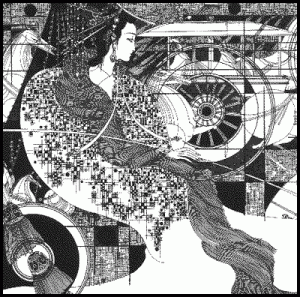
Wang Zhaojun is perhaps the best known of China’s “political brides”. Many tales have been told about her life.
Her name was Jiang, her style Zhaojun but during the Jin Dynasty, she was referred to as Minghou as the name Zhao could not be used by ordinary folks since the king, Sima Zhao had the same surname. Later generations, however, addressed her as Mingfei.
A native of Zigui ( in Western Hubei province), she entered the imperial harem during the reign of Emperor Yuan of Western Han (48-33 BC). The emperor chose companions from his vast harem of maidens by looking at their portraits. As a result of this practice, it had become the custom for palace ladies to offer large bribes to court artists to ensure that they painted a flattering likeness. Wang Zhaojun, however, was confident of her natural beauty and refused to pay the court painter, Mao Yanshou, his customary bribe. As a result, from her finished portrait, she seemed to be the ugliest of all the palace ladies and thus, never received the emperor’s favour.
When the Xiongnu chieftain, Huhanxie became a subject of the Han empire, he told Emperor Yuan: “I wish to take a Han beauty as my empress.
To cement relations with this barbarous nation, Emperor Yuan agreed to the request. Unwilling to pick out a real beauty, the emperor ordered that the plainest girl in the harem be selected for the marriage. When the lady-in-charge of the harem sent the unflattering portrait of Wang Zhaojun to the emperor, he merely glanced at it and nodded his approval.
Only when she was on the point of departure did Emperor Yuan set eyes on her. Much to his dismay, he realised that she was in fact the loveliest woman in his harem. Emperor Yuan was intent on finding out how such an error could have arisen. He discovered that the blame lay with the fraudulent behaviour of the court artist Mao Yanshou so Emperor Yuan ordered that he be put to death.
This redress, however, came too late for Wang Zhaojun. Dressed in the regalia of the Han court, clutching her Pipa to her bosom, she travelled beyond the Great Wall. Wang Zhaojun never returned and died in a distant barbarous land. There is a rich and poignant poem entitled Song of Mingfei:
“When Mingfei left the palace of Han,
Face damp with tears, hair hanging loose,
Turning her lowered head she gazed back, expressionless.
And her sovereign could not restrain his anguish.
Blame lay in an artist’s hand,
Few had he seen so pleasing to the eye.
Yet the source of such beauty was not painted;
Mao Yanshou was killed at once.
Departing, she knew, never to return,
Pitiable in the costume of the Han court.
Her plaintive voice asking for news of the south.
Where only the swan geese flew and returned each year.
Messages sent by her family, ten thousand li,
So that she in the foreign land will not pine.
Close by, Chang’an gate has locked out the beauty,
Life’s aspirations thwarted by neither north nor south.
Zhao Feiyan
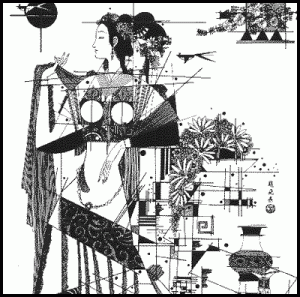
Emperor Cheng (37-2BC) of the Western Han Dynasty was highly impressed by the grace of two dancing girls who performed in the home of his sister, Princess Yang’a. The two girls were twins. The elder sister was especially light and fragile, like a swallow. To the emperor, she seemed as if she could perform her wondrous dance on the palm of his hand. He was enchanted. When the banquet was over, Emperor Cheng took the two girls to his palace and gave the elder sister the name Feiyan (d. AD 1) which means “Flying Swallow.”
The twins’ father was an impoverished music teacher named Feng Wanjin. His wife, of the Wang dan, bore him two daughters; the elder named Yizhu and the younger, Hede. Following the death of their father, the twins and their mother became vagrants. They travelled to Chang’an, the capital, where they were taken in by a servant, Zhao Linsuo from the household of Princess Yang’a. They adopted his family name. Yizhu and Hede grew up to be women of great beauty and grace. As their natural father had nurtured their musical talent and dancing skills, they were able to work as dancing girls in the princess’ residence.
Dance is a magical art which can dazzle, enchant and awe the audience. Zhao Feiyan and her sister made full use of their charms to gain the undivided attention of Emperor Cheng. Before long, they were both awarded the title Jieyu, meaning “Beautiful Companion” denoting that they were concubines of the second rank. After Emperor Cheng had cast out his former favourite, Zhao Feiyan became his empress and her younger sister was given the title Zhaoyi, making her a concubine of the first rank. It is said that for the next decade, the emperor favoured only Zhao Feiyan and her sister. He kept company with them every day but, unfortunately, neither of them bore him any children.
Emperor Cheng died suddenly as a result of his dissipated lifestyle. His younger brother, Emperor Al accended the throne, and he too became besotted with the sisters. Throughout his reign, he was always at their side. When he too, died a sudden death, Zhao Feiyan and her sister were immediately stripped of their positions.
Having received imperial favour for two reigns and having been appointed mothers of the nation; the sisters were mortified by their sudden fall from grace. Ashamed to show their faces in public, Zhao Feiyan and her sister committed suicide together.
The common folk, however, had little sympathy for the sisters for it was widely believed that they had used their dancing to bewitch the emperors and brought harm to the country. Few realised that the emperors had brought the destruction upon themselves.
Ban Jieyu
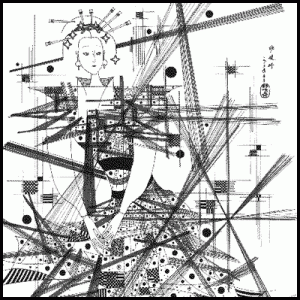
Like Zhao Feiyan, Ban Jieyu (b. 48 BC) was a favourite of Emperor Cheng. Unlike Feiyan, later generations viewed her with a great deal more sympathy.
Ban Jieyu was a lady of culture. She came from an eminent family, being the daughter of Ban Kuang, a commander of the Yue cavalry. Since early childhood, she had been confined to the courtyards of her home, subjected to all the strict Confucian social ethics which permeated feudal society. Her childhood was very different from that of Zhao Feiyan who grew up as an impoverished vagrant.
After being chosen to enter the imperial harem, she soon rose to imperial favour and the emperor awarded her the title Jieyu. As she paid meticulous attention to social status and rank, she forbade those around her to use her original name, insisting that they call her by her official title. Eventually, her real name was forgotten and she became known as Ban Jieyu. In fact, she adhered so rigidly to the rules of propriety that her natural feminine charm became quite overshadowed by her priggishness.
On one occasion, as she dallied with the emperor in the palace courtyard, he asked her if she would accompany him on a carriage ride. Quoting the classics, Ban Jieyu answered: “The wise emperors of ancient times were all accompanied in their carriages by worthy officials; only the self-indulgent and foolish monarchs drove with women by their side. If I accompany you, will you not resemble the latter?” Emperor Cheng was disappointed by her answer. Palace officials were also forbidden to enter the women’s quarters for if they were to escort the emperor on these pleasure trips, she reasoned that there would be no one left to attend to the affairs of the state.
The observance of social etiquette was Ban Jieyu’s overriding obssession. Although a beauty, her icy manner kept people at a distance. In this, the difference between Ban Jieyu and Zhao Feiyan was great. Consequently, Emperor Cheng gradually became estranged from Ban Jieyu as he became more attracted to Zhao Feiyan.
Ban Jieyu realised that she had fallen from favour. Eventually she was moved to Changxin Palace where she was placed in the service of the Empress Dowager. She had only herself to blame for her sorrow. A learned woman and a poet, she composed a verse entitled Song of Sorrow:
“Taking newly woven silk,
Bright as frost, pure white like the winter snow,
And fashioning it into a friendship fan,
Round as the brilliant moon.
Wherever you go, you will carry it in your sleeve,
And use it to stir up a welcome breeze.
And yet I fear that when autumn arrives,
And icy winds steal the summer’s heat,
The fan will lie discarded in a bamboo box,
Forgotten like the love of former days.
When Emperor Cheng died, she had a monument made and inscribed with this poem, placed within his tomb. Having refused to accompany him in life, in this way, she was able to watch over him in death.
Ban Zhao
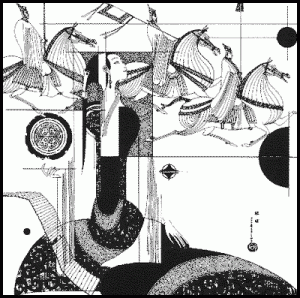
China’s first female historian, Ban Zhao (AD 48-117) made a lasting contribution to Chinese history and culture through her completion of the Han Shu.
The Hanshu or Book of Han, follows the Shiji as a continuation of China’s written history. It covers the reigns of twelve Han emperors, from Gaozu to Pingdi; almost three hundred years of the Han Dynasty. The work had originally been the ambition of her father, Ban Biao, who collected materials and laid the foundation for the work. Following Ban Biao’s death, the work was taken up by his son Ban Gu, Ban Zhao’s elder brother. He amassed information for twenty years and brought the Book of Han up to the reign of Emperor Zhang. Ban Gu later died in prison and so Ban Zhao continued with the work, collecting historical data and setting in order her father’s and brother’s library of manuscripts. She herself wrote the Treatise of Astronomy, thus completing the Book of Han.
Ban Zhao came from Fufeng in Pingling and was born into a well-known family of scholars. The influence of those around her and her own intelligence led her to be known for her literary talent even from an early age. Her personal name was Ji, her style Huiban and at the age of fourteen, she was given in marriage to Cao Shishu. After his early death, Ban Zhao protected her good name by refusing to remarry, thereby observing the laws of widowhood. Emperor He of the Eastern Han then summoned her to his palace. The empress and imperial concubines were placed under her tutelage to study the laws of moral conduct which she had set down in her work entitled Nüjie or Commandments For Women. She was well respected and people called her Cao Dajia, after her late husband’s surname and Dajia, meaning Great Master, in recognition of her achievements.
Ban Zhao never boasted of her knowledge and ability, nor did she seek fame, wealth or official rank. Her poem Dongzheng Fu (Travelling East), reflects her self-effacing character and a little of her attitude towards literature and mankind:
“The thoughts of the princely man
Ought to be written down.
But why should one not voice his own opinion?
As we admire the ancients, (so I attest to that)
Every action of that virtuous one (my father)
Meant a literary creation.
Even though I am not wise,
I dare not but follow him.
Honour and dishonour, poverty and wealth,
These may not be sought.
With body erect, let us walk the Way!
And bide the proper time.
Our life may be long or short.
The stupid and the wise are alike in this.
Let us be quietly reverential; resigned to our Destiny,
Regardless of whether we are good or evil.
Let us respect, be careful, and not be indolent;
Let us think of being humble and temperate;
Let us be pure and calm, and want little,
Like the Master Gongchao.”‘
Lady Li
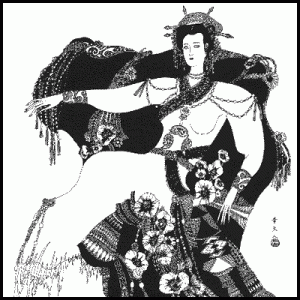
Li Yannian was the favourite court musician of Emperor Wu of Western Han. One evening, during a grand palace banquet, he sang a new ci.
“In the north there lives a beauty
Without equal on this earth.
A lady so lovely that she may cause
The cities of man to crumble,
The nations of man to fall.
Yet she knows not her own charm.
Nor does she wish
To conquer cities
Or destroy our nations.
Oh, what joy it is to win this rare exquisite prize!”
Emperor Wu sighed and said: “That is indeed a beautiful song, yet can there really be such a lady!”
Emperor Wu’s sister, Princess Pingyang, heard his remark. Smiling, she told him: “The beauty Li Yannian is singing about is none other than his own sister.”
And so it came to pass that Li Yannian’s youngest sister was summoned to the palace. She was a skilled dancer and devastatingly beautiful. Emperor Wu was astounded by her loveliness and adored her passionately. He married her, and she was given the title “Furen”, which means “Lady”.
Lady Li bore Emperor Wu a child, yet it seems that she herself was born under an ill-fated star for she died in her youth. The emperor was greatly saddened. Unable to accept the fact that he should be separated from his love, he ordered that a likeness of Lady Li be carved upon the wall of Ganquan Palace. Day and night, he gazed upon this image, remembering their past happiness.
The alchemist, Qi Shaowengz told Emperor Wu that he could summon Lady Li’s spirit and order it to manifest itself. That night, by the light of a lamp, a curtain was erected in front of the likeness of Lady Li. Emperor Wu, seated beneath a canopy some distance away, was instructed to watch closely. Just as the alchemist had predicted, halfway through the night, the emperor saw an alluring figure emerging from behind the curtain. Emperor Wu jumped up, rushed to the wall and pulled aside the curtain, just in time to see the mysterious woman stepping up to the wall and merged into the image of Lady Li.
Lady Li was a divine beauty who could easily have brought a nation to its knees; yet she was gentle and refined; and chose to serve, rather than destroy, the Han Dynasty.
Princess Wusun
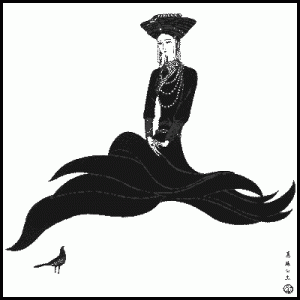
The Wusun were an ancient nationality who lived in the Western Regions. At the time of the Han Dynasty, the Wusun territory was fairly large, including a section of modern day Xinjiang. The Wusun people had “jade green eyes and red whiskers” and were descendants of the Turks.
Princess Wusun, however, was not a member of this tribe. She was a Han lady, the niece of the Han emperor, and her original name was Xijun.
The emperor wanted Wusun as a vassal state. To fulfil his ambition, he decided to give Xijun to King Kunmo of Wusun. As the king’s first wife, Xijun took the name Wusun Gongthu which means Princess Wusun. She was the first of China’s many “political brides”.
King Kunmo was already an old and ailing man. Moreover, he viewed his new wife with some suspicion. To Xijun’s surprise and horror, the king was determined to marry her off to his grandson, Centou. When the princess learned of this plan, she immediately dispatched a letter to Emperor Wu requesting for his help. The Emperor, however, simply advised her to comply with King Kunmo’s wishes. The unfortunate princess became no more than a plaything for King Kunmo and his kinsmen. Reflecting on her bitter fate, Princess Wusun wrote a poem, entitled Song of Melancholic Times:
“Oh! My family have married me to the first who offered,
And they left me in this strange and distant land,
Wife to the King of Wusun.
With a domed hut for my boudoir, oh!
And felt for walls.
Meat for my dinner, oh!
And curdled milk to drink.
To live in this barbarous land
Wounds me to my soul,
I long to tread the yellow earth
And return to my old home.”
Since Princess Wusun’s time, countless women of all nationalities had been used to cement diplomatic relations through marriage. Perhaps these “political brides” might have taken a word of warning from their predecessor, Princess Wusun.
Cai Wenji
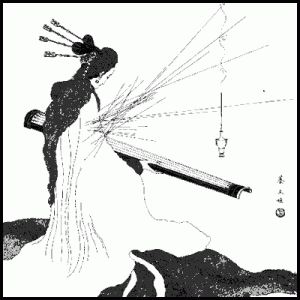
Cai Wenji was the daughter of Cai Yong (AD 133-132), a famous scholar and official of Eastern Han. Her name was Yan, her style Wenji and she was both a learned scholar and a proficient musician.
On one occasion, as she listened to her father play the qin, she asked: “Father, is the second string broken?”
It was, but Cai Yong suspected that his daughter had just made a lucky guess. He deliberately snapped the fourth string to test her and was astonished when Cai Wenji said: “Now the fourth string is broken too.”
Cai Wenji married a man named Wei Zhongdao from Hedong. Following his untimely death, she returned to her father’s house as a widow. Towards the end of the Han era, the country was thrown into turmoil. Cai Wenji was captured by Hu troops and carried off to their city. She lived in the Hu territory for twelve years as the concubine of a Xiongnu prince, named Zuoxian and bore him two sons.
A sincere friendship had existed between Cai Yong and the Wei warlord, Cao Cao. Sensing Cai Yong’s loneliness, the warlord sent precious gifts to Prince Zuoxian in exchange for Cai Wenji.
Thus, Cai Wenji returned to her homeland where Cao Cao arranged for her to marry an officer named Dongsi. After Cai Yong’s death, all his work would have been lost if not for the fact that his daughter had a good memory. She set down all that she remembered, word for word and presented it to Cao Cao.
Cai Wenji had led a turbulent life. In some ways, even her good memory proved to be a burden to her as she constantly longed for the two sons she left behind in the Hu region. She was also haunted by thoughts of her carefree childhood. Poetry was her consolation and this was where she expressed her sorrow and anger in works such as Poems of Sorrow and Resentment and Eighteen Laments Sung To A Hujia from which the following excerpt is taken:
“At the time of my birth, the land was at peace,
But later, the Han Dynasty fell into decline.
Heaven is unkind, allowing wars, suffering, separation;
Earth is unkind, that I should have to live at such a time.
Weapons of war are everywhere, making the roads perilous.
Soldiers and people fleeing to exile, suffering together.
The land, billowing clouds of smoke and dust, is a prisoner of the Hu.
Integrity and willpower have disappeared.
I cannot accept the vulgar barbarous customs,
Humiliated and abused, to whom can I turn?
I sing to my hujia and qin,
But no one knows my anger and my grief.”
Ma Gu
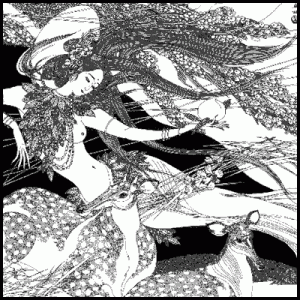
The saying “the cock crows at dawn” may be found in many Chinese stories. It originates from the tale of Ma Gu.
Ma Gu, which in Chinese means “Pock-marked Girl”, is a somewhat inappropriate name for this compassionate beauty.
According to legend, Ma Gu lived during the Eastern Han Dynasty and was not of Han origin. She was the daughter of the barbaric general Ma Qiu, a tyrannical commander with a violent temper.
Once, when supervising the building of a city wall, Ma Qiu demanded that the press-ganged labourers work day and night with little rest. When the cocks crowed to herald the arrival of each new dawn, the workers were finally allowed to set down their tools for a short while before starting on a new day’s toil. Although murmurs of discontent could be heard throughout the camp, the men so feared their ruthless general that no one dared to disobey him.
Ma Gu, seeing these appalling conditions, loathed her father, and pitied those under his command. She begged him to treat his men more leniently but he turned a deaf ear to her pleas and, when she persisted, he flew into a terrible rage. Ma Gu, realising that her father was stubborn, came up with a plan.
At the third watch (midnight), Ma Gu crept silently over to the hen-house and called out “cock-a- doodle-doo!”. The cockerels, hearing this imitation, immediately began to chorus “cock-a-doodle-doo!” Ma Qiu, believing that it was dawn, ordered his labourers to rest.
Ma Gu succeeded in tricking her father for some time. When he finally discovered the truth, he flew into a rage and ordered that his daughter be arrested and whipped. Fortunately Ma Gu was able to escape from her father’s wrath with the aid of the workers she had helped. It is said that Ma Gu fled to the distant mountains where she encountered strange and exotic people. Eventually attaining immortality, she resided on Penglai, the fabled abode of immortals.
Jia Wu
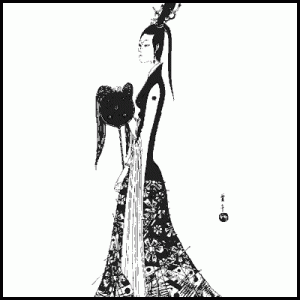
“The mansions of the nobility are inaccessible to the common man.” This saying describes the big gulf which separates the nobility from ordiniary men. Ladies, raised in the seclusion of such homes, were subjected to the strictest upbringing. However nature endowed mankind with a love of freedom and for many such women, the more they were forced to observe feudal and Confucianist rules of propriety, the greater was their desire to rebel. And so Chinese history and literature came to be peppered with women who went against social conventions for the freedom to love and marry whomsoever they desired. This was even more difficult for the daughter from an eminent family than for her peasant counterpart. Jia Wu is one such example.
Jia Wu was the daughter of Jia Chong, who came from a long line of marquises. Her father was an illustrious offical and a leading statesman of two dynastic reigns. Jia Chong adored his daughter, an elegant and peerless beauty. She grew up in an environment where discipline and refinement prevailed.
Jia Wu fell ardently in love with a minor official, named Han Shou in her father’s service. Han Shou was in charge of all the sundry duties of the Jia mansion. Jia Wu would often peep at him from her room, enchanted by the expression of intense concentration he wore as he carried out his mundane tasks. For her own amusement, the young lady would set down her affectionate thoughts in verse. Before long, Jia Wu’s maid learned of her mistress’ feelings for Han Shou and so she told the young official about this. Han Shou, having admired Jia Wu from a distance for some time, was overjoyed. With the help of the maid, the two young people were able to have frequent secret meetings.
Jia Chong observed that his daughter was becoming somewhat absent-minded but he thought little of this until he noticed that Han Shou was wearing an unusual scent. The perfume, a blend of lotus, sandalwood and musk had been a gift from the emperor. It had originally been sent to the emperor as a tribute from the Yueshe state of the Western Region. Jia Chong knew that he had received the only bottle and, smelling the scent on Han Shou’s clothes, he began to suspect the lovers’ affair.
Jia Wu’s maid had no choice but to make a full confession of the couple’s love when questioned by Jia Chong. When he confronted his daughter, she boldly admitted: “Yes father, I gave the emperor’s perfume to Han Shou because I am in love with him!”
Astounded by her frankness, Jia Chong had no choice but to allow her to marry Han Shou.
Jia Wu won her love through single-minded disobedience. Her story gave birth to the phrase “tou xiang” which means “stolen fragrance”
Luofu
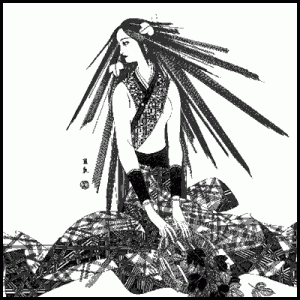
“The sun rises in the south-east
And illuminates the house of the Qin family.
There was a lovely daughter of the Qin clan
Called Luofu.
Luofu loved to tend the silkworms,
Pickinfi mulberry leaves south of the town.
Her basket handle was of green silk,
The hooks of cassia twigs.
With flowing hair
And bright moon pearls in her ears.
Donning a skirt of pale yellow silk
And a violet blouse.
When passers-by saw Luofu,
They would set down their shoulder poles
And stroke their whiskers.
When young men saw Luotu,
They would raise their hats
Revealing their bound up hair.
Tillers would forget their ploughs,
Farmers their hoes,
Going home they would be bitter
That their wives were not Luofu.”
An imperial governor came from the south.
His entourage of five drew to a halt. The
governor ordered the envoy to find out who she was.
“She is the lovely daughter of the Qin clan,
And she calls herself Luofu.”
“How old is Luofu?”
“Above fifteen, but not yet twenty.”
“The Governor would like to ask Luofu
If she would care for a ride in his carriage?”
Luofu stood in front of the governor and replied:
“Governor, you are a fool!
The Governor certainly has a wife of his own,
And I, Luofu, have a husband.”
These lines comprise the first two stanzas of the famous poem Gathering Mulberries By The Path, which tells the story of a girl who dared to oppose evil officials who abused their power.
In Han times, senior inspectors or governors toured the land under their jurisdiction each spring These journeys were called “tours to observe the common people” and “tours to encourage the people in mulberry farming”. Ostensibly a means of assisting the rural population, they were in fact for the purpose of finding beautiful young girls and to generally harass the population.
One radiant spring morning, the enchanting Luofu went our to pick mulberry leaves and chanced upon the inspector and his retinue. The inspector immediately wanted to have her and sent his high-handed request. Luofu told him bluntly:
“Governor, you are a fool!”
The pompous official was stunned by her righteous indignation and galloped away in displeasure, followed closely by his attendants.
This tale of a common working girl, who was bold and quick-witted enough to defy a powerful official, has always been greatly appreciated.
Diaochan
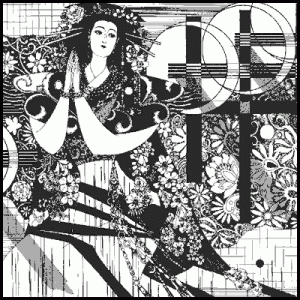
Diaochan, whose name is not to be found in official history books, plays an important role in the Romance Of The Three Kingdoms. Her story, which is still well-known today, tells how two allies were so blinded by a pretty woman that they became enemies, one intent on destroying the other.
The events of this tale took place during Dong Zhuo’s monopolisation of power. One day, during a palace banquet, Dong Zhuo levelled false accusations against Situ Zhangwen, an official. All the eminent officials who had gathered for the feast watched in horror as Situ Zhangwen was dragged outside to be beheaded. Each man feared that the fate of the Han duke might well be his own.
When Prime Minister Wangyun returned to his residence, he was so disturbed by what he had seen at the palace that he was unable to sleep. He went for a stroll in the garden. Suddenly, he heard someone praying. The sound seemed to have come from behind a clump of peony trees. Stepping over to investigate, Wangyun realised that it was Diaochan, a singing girl from his own household.
Diaochan had come to the Wang mansion as a young child and Wangyun had looked upon her almost as if she were his own daughter. He asked her: “What are you doing here in the middle of the night?”
She answered him: “From early childhood, I have benefitted from your kindness and have often wondered how I may one day repay you. Recently you have been so sad and despondent; yet I do not know how to alleviate your suffering. That is why I am sighing. Please tell me how I can help you. I will do whatever I can while I still have the strength!”
Wangyun led Diaochan into an inner room and, having dismissed the servants, went down on his knees before her. Shocked and flustered, Diaochan begged to know what was troubling him. Wangyun spoke to her earnestly: “Our country is in great peril. I think you may be our only salvation. The despot Dong Zhuo wants to see himself enthroned as the Son of Heaven while the court officials can only look on helplessly. I have a plan to end his scheming. With your wit and charm we may be able to drive a wedge between Dong Zhuo and his adopted son Lü Bu. If we can end their alliance, and cause them to fight against each other, we may be able to eliminate them both.”
Diaochan agreed at once to do her best. Wangyun took the earliest opportunity to betroth Diaochan to Lü Bu; at the same time presenting her to Dong Zhuo as a concubine. Both Dong Zhuo and Lu Bu became fond of her and could not decide how to settle the matter. As the hostilities grew, Diaochan took every opportunity to add fuel to the fire and the two men became fiercely jealous of each other. Eventually, Wangyun was able to gain Lü Bu’s assistance in assassinating Dong Zhuo.
Unfortunately, soon after, both Wangyun and Diaochan were put to death by surviving members of Dong Zhuo’s clique.
Empress Zhen
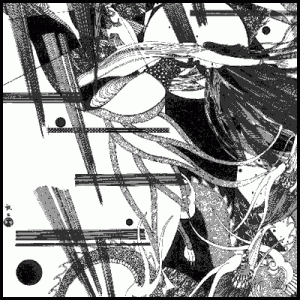
AIthough Mifei is hailed as the goddess of Luo River, Cao Zhi’s poem Luo Shen Fu is reputed to have been written in memory of another lady, Empress Zhen (AD 182-221).
Fufei may be considered the most beautiful of women, yet Empress Zhen may have been more than a match for her. Great men such as Yuan Shao, Yuan Xi (a famous warrior), Cao Cao, Cao Pi (who later became Emperor Wen of Wei) and Cao Zhi (a poet), had all paid homage to her charms.
Empress Zhen came from Wuji in Hebei and grew up to be an attractive lady. When Yuan Shao captured the city of Ye (north of Anyang County, Hubei), he met Empress Zhen and immediately was determined to let his son Yuan Xi have her. In AD 204, Cao Cao crossed the river and routed Yuan Shao’s army. On occupying the city of Ye, the first thing he did was to send a guard into the city with orders to protect and ensure the safety of Empress Zhen. Cao Cao wanted to have Empress Zhen for himself and was disappointed when told that his son Cao Pi had already gone to claim her. He sighed and said:
“This year we have fought and defeated many great enemies. Were these wars fought for the sake ot one woman?”
Before Cao Pi could lay claim to Empress Zhen, she had already met his brother Cao Zhi and love had blossomed between them. Nevertheless, Cao Pi was destined to become Emperor of the Wei Dynasty (AD 220-265)and he made Empress Zhen his empress. She bore him a son who became Emperor Ming of Wei, and a daughter, Princess Dongxiang.
Empress Zhen and Cao Zhi met in secret many times and lamented over the tragedy of their separation: yet throughout this time Cao Zhi never had an affair with her. Eventually Cao Pi’s attentions wandered and he found a new favourite, Empress Guo. Empress Zhen expressed her resentment over this matter openly and her dissatisfaction reached the ears of Cao Pi who ordered her to commit suicide.
Meanwhile Cao Zhi was travelling back to Louyang from his fiefdom. As dusk approached, horse and rider grew weary and stopped to rest on the bank of the Luo River. Suddenly, in the twilight there appeared a woman of ethereal beauty standing upon a rock. She was as exquisite as Empress Zhen and Fufei. Cao Zhi, transfixed by her appearance, longed to rush forward and pour out his heart’s sorrow but she vanished in an instant. Only an earring was left behind. Cao Zhi believed that he had encountered the goddess of the Luo River.
When he arrived at Luoyang, Cao Zhi was shown an embroidered pillow. Cao Pi told him it had belonged to Empress Zhen and it was thus that Cao Zhi learned of her death. Fillied with anguish, he wrote the Luo Shen Fu, a poem which has stood the test of time.
The goddess of Luo River: Is it Fufei or Empress Zhen?
Baogu
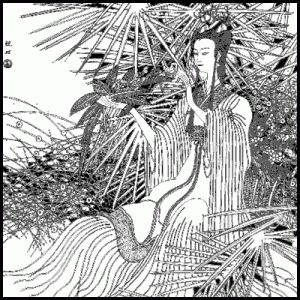
Few female physicians appear in China’s historical records; of those who do, Baogu is the first and most renowned.
Named Qianguang, Baogu lived during the Eastern lin Dynasty (AD 317-420). Her father, Bao Qian, was a commander in southern Guangdong province. He was a Taoist with knowledge of the Qi Huang Plan, a famous medical treatise and techniques for refining the pill of immortality. Baogu grew up in a home full of drugs and potions where little attention was paid to pursuits such as needlework, which feudal Confucian society deemed suitable for a girl. Undoubtedly, the environment in which she spent her childhood days prepared Baogu for her brilliant medical career, made doubly possible by a fortuitous marriage.
When she was twenty years old, her father arranged for her to marry his close friend, and fellow Taoist, the famous chemist and doctor, Ge Hong. Born into a poor family, Ge Hong had spent his boyhood days in the mountains gathering firewood, and his nights studying tirelessly by lamplight. He became a leading scholar, researching “the pathway to becoming an immortal”, poring over commentaries on the elixirs of longevity and eternal life.
Taoist teachings on immortality and death were magical and obscure; but generations of research into the elusive pill of immortality had produced a wealth of material on chemistry, medicine, metal smelting and astronomy. As a woman, Baogu would have been barred from the Taoist activities on the refinement of life-prolonging potions, but the ancient Taoist tomes to which she did have access were an open door to the world of medicine. She travelled with her husband through southern Yue (Guangdong province), “plucking and testing one hundred herbs, finding cures for strange diseases, saving countless lives”
Baogu’s medical skills were superb, especially in the field of moxibustion. Acupuncture and moxibustion, the traditional Chinese methods of treating illnesses, were already highly developed techniques by the Spring and Autumn Period (770 – 476 BC). During the times of Han and Jin, many medical works were written, most of which were primarily concerned with acupuncture. Building on the knowledge of their forefathers, Baogu and Ge Hong worked together on their first treatise to emphasize the theories of moxibustion; the Zhouhou Beiji Fang. Although the finished work was due to Baogu’s painstaking research, it is Ge Hong who is remembered through the ages because Baogu was a woman.
The talent for which Baogu became most widely known was her ability to remove tumours and warts. According to ancient records, Baogu used the chinese mugwort which came from Yue Hill (present- day Yuexiu Mountain in Guangdong) to treat unwanted tumours with moxibustion. After one burning, the tumour would be removed and there would be no recurrence. Each tumour or wart, after being treated once with moxibustion, would be immediately healed. Not only would the patient recover from his illness, his looks would also improve.
Baogu gathered herbs and practised healing all her life, travelling over mountains and rivers. She “followed the path of moxibustion to the southern seas” and saved countless lives. Her mystical ability to heal the wounded and save the dying earned her the respect of later generations. In the many places where she had travelled to heal the people, many monuments were built in her memory.
Madam Wei
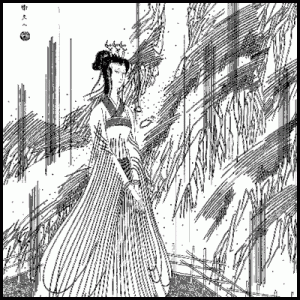
In ancient China, calligraphers, like physicians, were predominately male. The earliest known female calligrapher was Madam Wei of the Eastern Jin Dynasty (AD 317-420). She had a profound influence on the art.
Madam Wei was from Anyi in Hedong (present-day Xia county in Shaanxi province). Her name was Shuo, her style Maoyi. She came from a family of highly influential calligraphers. Her great- grandfather Wei Ji, grandfather Wei Guan, and uncle Wei Heng, were all well-known calligraphers of the Wei Dynasty (AD 220-265). They founded a vigorous style of calligraphy known as the Northern School. The members of Madam Wei’s family were all erudite scholars. She began her painstaking study of calligraphy at an early age, under the supervision of her grandfather and uncle. While still a child, her writing was already extraordinary. Her grandfather knew that she was talented, so he asked the most famous calligrapher of the day, Zhong Zhou, to be her tutor.
Madam Wei was indebted to Zhong Zhou but she did not follow him blindly; she had the courage to try out new ideas and soon developed a powerful reputation of her own. She advocated that one should not “paint the gourd ladle in accordance with the calabash” when practising fundamental writing techniques; capturing the form but not the essence. One must learn from the creator and follow the example of nature. A meticulous observation of nature can enhance the imagination, thereby fueling artistic creativity.
Looking at high peaks and overhanging rocks, she understood that ” ~ ” had to be written with a swift, violent stroke. On seeing an ancient withered vine, she concluded that ” 1 ” should be written with a gentle, fluid hand. In this way, she pioneered a new style of calligraphy. Later generations praised her style:
“Ice like a shattered jade bottle,
A moon of brilliant jade,
Elegant as fragrant trees,
Solemn as a cooling breeze.”
Madam Wei summarised the knowledge of former generations of calligraphers and added her own experiences to write the famous theoretical treatise Bijin Tu (Chart of Brush Position). In this work, she emphasised that calligraphers must first attain an understanding of how to hold and move the brush. She also gives a vivid outline of the seven techniques for writing Chinese characters. She puts forward the theory of power and muscle: “Those with strength have much bone, those without strength have much flesh; those with much bone and little flesh may be called muscle writers, those with much flesh are known as ink hogs. Those with strength and muscle are sages, those without strength and muscle are sick.”
This novel idea became a criteria by which future generations came to appreciate and judge beauty. Apart from this, she also suggested that “when one begins to learn, one should start with the bigger characters, not the minor”; an approach to calligraphy which is still adhered to today.
Madam Wei was an enthusiastic teacher who tested her own theories by instructing others. She introduced the eminent Eastern Jin calligrapher, Wang Xizhi to his art. Although the scholar eventually surpassed the master, perfecting the art and attaining a profound understanding of the theory of calligraphy, the influence of Madam Wei’s style was still clearly visible in his work.
Green Pearl
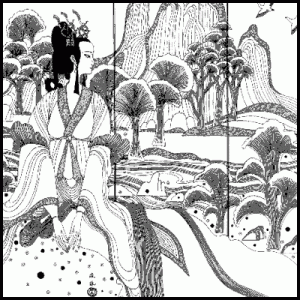
Green Pearl (d. AD 300), whose surname was Liang, was a native of Bobai and the favourite concubine of a wealthy man, Shi Chong who lived during the Western Jin Dynasty (AD 265-316). Green Pearl was originally a singing girl skilled at playing the flute and dancing. Her charm and skills won many hearts. Shi Chong was captivated by her; each day he went to the theatre to watch her perform and to show his adulation. Finally he decided to redeem her from her procuress. Although Green Pearl’s procuress asked for an exorbitant price, Shi Chong was unperturbed and bought her with three pearls of great value.
Shi Chong came from Nanpi. He rose through the military ranks to become colonel of the guards, but later became a merchant. Soon, he became a very rich man. Having acquired Green Pearl, he ordered that a lavish villa be constructed in Jingu, Henan. There, the two of them sang, danced and feasted their days away. The mighty King of Zhao heard about Green Pearl and his base lusts were aroused. He sent Sun Xiu to the villa at Jingu to bring Green Pearl back to the imperial palace.
Shi Chong gathered many of his maids and concubines, all exquisitely dressed, and presented them to Sun Xiu, saying: “Please choose the beauty whom you like.”
Sun Xiu replied adamantly : “I am here to bring Green Pearl back! You can keep the rest!” Shi Chong was incensed: “No!” he bellowed a flat refusal. “Green Pearl is my favourite! I shall not give her to the King of Zhao!” With that, he ordered his men to throw Sun Xiu out of the villa, cursing him for his impudence.
Seething under the insult of such high-handed treatment, Sun Xiu loathed Shi Chong greatly. Hence, he told the king an exaggerated version of events to incur the king’s wrath. To Sun Xiu’s delight, the king immediately ordered troops to surround the villa at Jingu to capture Shi Chong.
With tears in his eyes, Shi Chong took Green Pearl’s hand and told her: “Because of you, I have become a criminal but I have no regrets!” Then Green Pearl spoke:
“It is only proper that I should present to you the gift of my life! ” Freeing herself from his grasp, she jumped to her death from the upper storey of the tower where they had been feasting. King Zhao’s troops stormed the villa, beheaded Shi Chong and burnt down his villa. In later times, his actions were criticized in this poem:
“The bones of a courtesan settle nothing,
That day, Shi Chong was too enamoured of his love.
Refusing to make a gift of his bright pearl;
Shaken from his tranquil tower-top dream.
Taking seven steps, she was shattered like coral,
Her body soft as a fallen flower.
Where were the dancers and singers that year;
The gardens of Jingu lay empty beneath the full moon.”
This poem draws the dubious conclusion that Shi Chong should have complied with the king’s wish.
Xie Daoyun
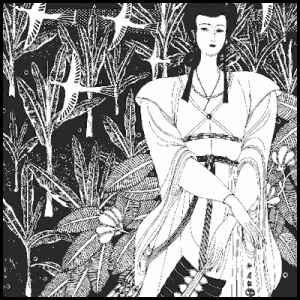
Xie Daoyun lived during the Eastern Jin Dynasty. She was the niece of eminent statesman Xie An and the wife of Wang Ningzhi, the calligrapher. Her place in the annals of history is due to her eloquent debating skills.
Xie Daoyun showed signs of intelligence and eloquence from an early age. One day, while watching the snow fall, Xie An asked Xie Daoyun and her elder brother: “What does this snow scene resemble!” His nephew, Xie Zilang replied: “It is just like salt sprinkled from the heavens.” Xie Daoyun offered a different answer: “Is it not like a sky full of willow catkins blown about by the wind?” Xie An was so delighted with his niece’s reply that he and future generations, often referred to her as “the talent that praises willow catkins”.
Following her marriage to Wang Ningzhi, Xie Daoyun had further occasion to demonstrate her debating skills. She lived during a perilous time when men were treacherous and malicious, and scholars neglected affairs of the state, preferring instead to pursue fame and indulge in idle chatter.
On one occasion, Wang Ningzhi’s younger brother, Wang Xianzhi found himself cornered while debating with his guests. Xie Daoyun followed the discussion from an adjoining room and, hearing that her brother-in-law was in difficulty, sent a maid to inform him that she wished to offer her assistance. As Wang Xianzhi and his guests found the suggestion entertaining, Xie Daoyun had a silk screen placed in the room and she sat behind it. Picking up where Wang Xianzhi had left, she argued with such fervour and skill that no one could find a way to contradict her and, before long, all the guests were silenced.
Besides being an eminent scholar, Wang Ningzhi was also a successful politician who held one official post after another. Unfortunately, he met his end at the hands of enemy soldiers during the uprising staged by the traitor Sun En. As a result, Xie Daoyun herself went to the battlefront, proving herself to be a woman of exceptional courage.
After the death of her husband, Xie Daoyun lived alone. During her lifetime, she never sought fame or fortune and in her final years, she had no quarrels with the world, passing her time by writing poems. Her poems were very touching:
“In the east, lofty mountains
Soar up to touch the blue sky.
Between the peaks plunging voids,
Lonely, remote, dark.
This is not the work of a craftsman,
These clouds were formed by nature.
What is there in this scene
Which makes me feel the constant changes?
Passing under the eaves of this great house,
I can live out my alloted span.”
Princess Lechang
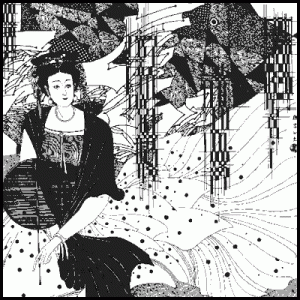
Princess Lechang was the younger sister of Emperor Houzhu of the Chen Dynasty. Although her brother was a dissolute man, the princess herself was a virtuous woman, worthy of admiration. She was given in marriage to Xu Deyan, a member of the east palace retinue, and they were devoted to each other.
The Chen Dynasty, however, was in rapid decline. One day, Xu Deyan said to his wife: “A lovely intelligent woman like you will survive, even if this dynasty is overthrown. You will find favour with another wealthy protector. Undoubtedly, we shall be separated, perhaps forever. If there is a chance for us to meet again, use this as proof of our love.”
He took a bronze mirror and broke it in half. Keeping half of it, he gave the other half to the princess. They arranged that, should she survive, on the fifteenth day of the first lunar month, the following year; she would take her half of the mirror to the market and offer it for sale. If Xu Deyan were alive, he would go there to find her.
Before long, the Chen Dynasty was indeed overthrown. Princess Lechang was acquired by a man of power and influence, Yang Su who had been appointed Duke of Yue by the new emperor, Wen of Sui.
Xu Deyan suffered severe hardship. Homeless, he wandered through the land, finally returning to the capital on the appointed day. Walking through the market, he suddenly saw a servant trying to sell a broken bronze mirror. He rushed over and found that the mirror matched the piece he carried. The servant told him of the princess’ situation and that there was no way she could leave the palace to see him. Weeping with bitter disappointment, he recited a line of poetry: “Those who can make the mirror whole remain divided. Where is Heng’e’s reflection to be found? For the brilliant moon shines in empty splendour.”
The servant returned to the palace and repeated these lines to Princess Lechang. Filled with anguish, she resolved to fast in memory of her husband.
When Yang Su came to hear of the love his concubine harboured for Xu Deyan, he held a banquet in his honour and reunited the couple. During the feast, with tears in her eyes, Princess Lechang sang:
“Today is a day of changes;
My new lord looks upon my former master,
Neither daring to laugh not cry,
For honesty brings with it pain.”
Xu Deyan and Princess Lechang travelled back to the south where they grew old together. This story gave birth to the saying, “pojing chong yuan” which literally means “a broken mirror rejoined”. It is used to describe the reunion of a husband and wife after they have suffered a forced separation.
Su Xiaoxiao
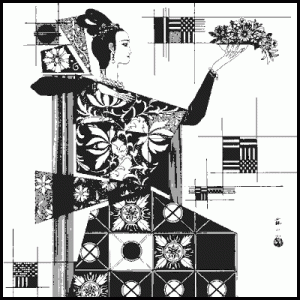
“Dew upon orchids,
Eyes filled with tears.
There is nothing to draw our hearts together,
These flowers in the mist I shall not cut.
Grass for a carpet,
Canopy of pines,
The wind is her skirt,
Water her girdle.
Her oil-silk carriage,
Waits in the sunset.
Cold emerald candles,
Are tired of shining,
Beneath the Western Tomb,
Where the wind drives the rain.”
Su Xiaoxiao’s Tomb, written by the great Tang Dynasty poet, Lihe (AD 790-816), was inspired by the grave of a famous courtesan who lived in Qiantang (Hangzhou) during the time of the Southern Dynasties.
According to historical records, Qiantang boasts of at least two famous courtesans, both named Su Xiaoxiao; one from the Southern Qi (AD 479-502) and the other from the Southern Song era (1127-1273). There was little known about Su Xiaoxiao from ancient records, except that she was “a pretty and skilled poet” and a few other lines which do not bear up on close examination.
All that is known for certain is that Su Xiaoxiao of the Southern Song Dynasty had an elder sister named Pannu. Pannu was the concubine of Zhao Bumin, a student of the imperial college, and because of this, Su Xiaoxiao eventually married Zhao Bumin’s younger brother.
Each era, from the Tang Dynasty onwards, had produced new poems about Su Xiaoxiao. It seems almost as if China’s scholars were all besotted by her.
The reason for such devotion is clear: Su Xiaoxiao was not only beautiful and unattainable, but also a gifted poet. Generations of literary men have been attracted to her as she was considered an “understanding courtesan” and the finest example of a talented prostitute who was well-versed in literature. Beside a bridge on the western bank of Hangzhou’s West Lake is Su Xiaoxiao’s tomb. It is not known, however, which Su Xiaoxiao lies buried within this grave.
Lady Huarui
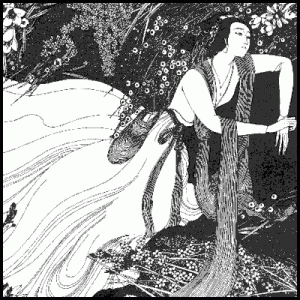
Lady Huarui (“Lady of the Flower Pistil”) was so named because she was delicate and exquisite in appearance. Historically, two ladies renowned for their beauty were both known as Lady Huarui.
The first is said to have been a concubine of King Wang Jian of the Former Shu Dynasty. Her surname was Xu and so she was known as Concubine Xu, or by the name of Lady Huarui. She gave birth to Wangyan who later became emperor and he appointed her the Holy Empress Dowager. She met her death at the hands of Emperor Zhuangzong of the Later Tang Dynasty.
The second Lady Huarui is the wife of Meng Xu who was an important official of the Later Shu Dynasty. Well versed in the art of poetry, she admired Wang Jian, the court poet of the Tang Dynasty greatly, imitating his style in her own collection of more than one hundred poems on palace life. Lady Huarui may well have been a pen-name which she chose and by which she later became widely known.
Palace poetry was verse which dealt solely with the way of life within the imperial palace and was usually written in the Yuefu style. It was poets such as Wang Jian and Lady Huarui who helped establish and promote this poetic tradition and, because of their contribution, they are known as “the forefathers of palace poetry”
Lady Huarui was as talented as she was beautiful; she was also a lady of great courage. During the third year of the reign of Emperor Taizu, the state of Shu was invaded by Song soldiers. Meng Xu was forced to surrender. The emperor gave him the title, Prince of Qin but Meng Xu, unable to bear the humiliation, died soon after. Lady Huarui refused to forget her dead husband and her country. Each day she ostensibly offered sacrifices to the image of her late husband, but the libation was meant for her lost country. To hide the true nature of her prayers from the Song courtiers, she told them that the image was in fact a deity, adding that it was an image of the deity Zhang, which had been passed down from generation to generation within her family.
Emperor Taizu admired Lady Huarui for her beauty and her palace verses. He summoned her to his court and demanded that she write a verse for him. Undaunted by this order, Lady Huarui composed a verse which mourned the defeat of Shu. It contained these lines:
“Two hundred thousand men at once disarmed,
Not one possessed the courage of a man!”
In this verse, Lady Huarui nor only expressed her grief, but also made a caustic attack on Shu’s surrender to Song. It gave voice to a fighting spirit which refused to accept defeat.
The younger brother of Emperor Taizu, Taizong, became aware that his brother harboured a secret love for Lady Huarui. He feared that, should this affection be allowed to grow, it might ultimately bring harm to the Song Dynasty. Using the excuse that Lady Huarui wrote verses which might incite rebellion, he killed her.
One Lady Huarui was a delicate aristocratic lady. The other was a gifted poet. Both did not shy away from the dangerous times in which they lived.
Zhu Yingtai
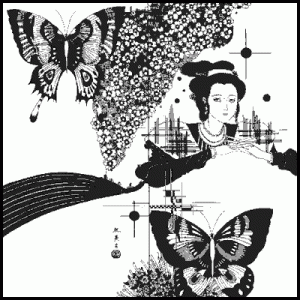
The story of Zhu Yingtai and Liang Shanbo is a well known tale of tragic love.
Zhu Yingtai was the only child of a wealthy squire from Shangyu county in Zhejiang province during the period of the Six Dynasties. Also known as Jiuniang, she possessed both beauty and intelligence. She loved studying from an early age. Her father chose many suitors for her, but when faced with each proposal, Zhu Yingtai would reply: “I want to study and see more of the world. After that, I shall marry and only if the man is virtuous and to my liking.”
Eventually, her father allowed her to attend school. The conventions of the age deemed that such behaviour was not fitting for a girl so Zhu Yingtai disguised herself as a boy and changed her name to Zhu Jiuguan before setting off on her journey.
During her travels, she met a young scholar, Liang Shanbo and the two of them travelled together to the Yixing Shanquan Mountain Academy, where they both enrolled as students. Before long, the two friends became inseparable, treating each other like brothers. Although they were classmates and even lived under the same roof for three years, Liang Shanbo never suspected that Zhu Yingtai was a girl. After graduation, when the time came for them to part, she told Liang Shanbo: “We must arrange a time when you can come to my house. I have a younger sister and I shall request that my father betroth her to you.”
Zhu Yingtai was, of course, referring to herself. Although Liang Shanbo agreed to the proposal, he felt unworthy of the match as he came from a poor family. The arranged day came and went – Liang Shanbo failed to keep his appointment. After returning home, Zhu Yingtai’s father insisted that she become engaged to a son of the Ma family. He remained adamant despite her objections. As for Liang Shanbo, only when he was appointed magistrate of Yin county, did he feel that it was time for him to call on Zhu Yingtai. He stopped at her home while travelling to take up his post and asked a servant: “Is Master Jiuguan home'” The servant replied: “The young mistress of the house is called Jiuniang. There’s no Jiuguan living here.”
Liang Shanbo began to suspect the true identity of his former classmate and asked if he might meet Jiuniang. Zhu Yingrai entered the room and greeted Liang Shanbo. Although she tried to hide her face behind a fine gauze fan, her tenderness and love for the young man was clear. Liang Shanbo, realising that she was a girl, was overcome with grief when she told him of her impending marriage. Filled with remorse and regret, he died sometime later of a broken heart. His last request was that his remains be buried at the foot of Qingdao Mountain.
Two years later, as Zhu Yingtai’s bridal procession passed by Qingdao Mountain on its way to the Ma house, there was a sudden fierce wind and the revellers were forced to stop. Stepping down from her bridal sedan chair, Zhu Yingtai saw Liang Shanbo’s grave and immediately fell to her knees, weeping bitterly. The grave burst open suddenly. She leapt inside and it closed up again. When the wind had calmed down, all that could be seen were two exquisite butterflies dancing together above the grave. They flew off together into the distance.
Even today, when the azaleas are in full bloom, you may well see two large butterflies, one yellow, the other black, fluttering and dancing together. People would point to the yellow one and say: “That’s Liang Shanbo”, and then to the black one saying: “That’s Zhu Yingtai.”
Hua Mulan
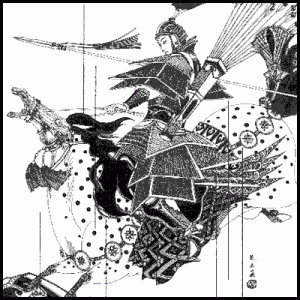
Another historical figure who is famous for disguising herself as a man is Hua Mulan. Her name has long been synonymous with the word “heroine”, yet opinions differ as to whether this is her real name. According to Annals of the Ming, her surname is Zhu, while the Annals of the Qing say it is Wei. Xu Wei offers yet another alternative when, in his play, Mulan Joins the Army for Her Father’, he gives her the surname Hua. Others using The Ballad of Mulan as their guide have attributed her surname to be Mu.
There is also some confusion concerning her place of origin and the era in which she lived. She is said by some to have come from the Wan County in Hebei, others believed she came from the Shangqiu province in Henan and a third opinion is that she was a native of the Liang prefecture in Gansu. One thing seems certain though. Hua Mulan was from the region known as the Central Plains.
Cheng Dachang of the Song Dynasty recorded that Hua Mulan lived during the Sui and the Tang Dynasties. Song Xiangfeng of the Qing Dynasty asserted that she was of Sui origins (AD 581-618) while Yao Ying, also of the Qing Dynasty, believed she was from the time of the Six Dynasties. No record of her achievements appears in official history books prior to the Song times. Stories circulated in China’s Central Plains indicate that she must have lived before the Tang Dynasty.
Both history books and legends do at least agree on one thing – her accomplishments. It is said that Hua Mulan’s father received an order to serve in the army. He had fought before but, by this time, was old and infirm. Hua Mulan knew it was out of the question for her father to go and her only brother was much too young. She decided to disguise herself as a man and take her father’s place.
The troops fought in many bloody campaigns for several years before they obtained permission to return home. Hua Mulan was summoned to the court by the emperor, who wished to appoint her to high office as a reward for her outstanding service. Hua Mulan declined his offer and accepted a fine horse instead.
Only later, when her former comrades in arms went to visit her, did they learn that she was a woman.
The story of Hua Mulan is well known and has provided much inspiration for poetry, essays, operas and paintings.
Princess Wencheng
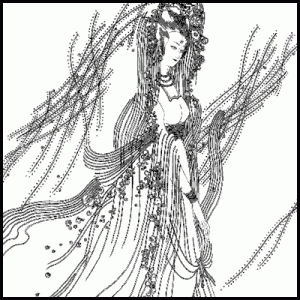
“The beauty leaves Chang’an
When will she return?
Grass obscures the horse’s hooves,
The north wind tousles her hair.”
These lines reflect the melancholic mood in which Princess Wencheng left her homeland to be married. A daughter of the Li clan, Princess Wencheng was adopted by Tang Emperor Taizong (AD 627-649) and Empress Changsun. She was given in marriage to King Songzan Ganbu (AD 617-650), ruler of Tufan (Tibet).
Princess Wencheng’s marriage was just one example of the practice known as “heqin” by which clans and dynasties cemented diplomatic relations through marriage. When a Han princess became the bride ofa barbaric leader, it was hoped that the alliance would promote harmonious relations and indeed such matches often promoted cultural exchanges, friendship and unity. For the lady involved, however, such a destiny was often viewed as a great misfortune.
King Songzan Ganbu was a brave and handsome king. When he was shown a portrait of Princess Wencheng, he fell in love with her immediately as he was struck by her air of dignified elegance. He sent a marriage proposal, but his hopes were dashed by King Tu Guhun of the Turkish tribe who spread slanderous rumours about him. King Songzan Ganbu, determined to have the princess for his bride, retaliated by gathering all his troops to attack Tu Guhun.
Having routed his enemies, King Songzan Ganbu invaded Songzhou, a part of the great Tang empire. Emperor Taizong realised that King Songzan Ganbu was fighting not for control over the Tang empire, but for the hand of the princess. Consequently, he accepted his proposal and betrothed Princess Wencheng to King Songzan Ganbu.
In the fifteenth year of Emperor Taizong’s reign, Princess Wencheng went on a long and arduous journey to the Tang border. King Songzan Ganbu had arrived much earlier to make arrangements for a grand ceremony. That same year, King Songzan Ganbu returned to Lhasa with Princess Wencheng. He was overjoyed now that his dearest wish was fulfilled.
He built a magnificent palace for her and wore the costume of the Tang court. As she was a Buddhist, he had two temples built for her. Because she was fond of willow trees, he had them planted everywhere. When she expressed her dislike for the local custom where people painted lines on their faces with burnt ochre, the king sent an order to forbid this century- old tradition. Finally, the king established a system of “rest posts” at one hundred mile intervals so that special messengers could carry letters and gifts to and from the Tang court.
Princess Wencheng was touched by her husband’s love for her and gradually came to care for him and her borderland home. She summoned Han artisans to Tufan to pass on their skills in metallurgy, farming, weaving, construction, milling, brewing and; the manufacture of paper and ink. The local farmers were taught new agricultural techniques to raise different varieties of grain. Han astronomy and the Chinese calendar were also introduced to the region. Perhaps the most important innovation was the writing system developed by Princess Wencheng and the king, for before her arrival, Tufan was without a written language.
Over the years, the princess’ affection for the king grew deeper. It would be impossible to say whether the way he treated her stemmed from his respect for the Tang Dynasty or whether he admired Princess Wencheng’s homeland because of his love for her. However it is certainly true char under his rule. Tufan was one of China’s most loyal tribute states.
As a “policical bride” sent away to a strange and distant border land, Princess Wencheng could hardly have hoped that the man she was to marry would not only be a fine husband but also an outstanding monarch. Nor could she have dreamt that she would have the freedom to pursue her own interests or that she would come to enjoy the respect of her subjects.
Undoubtedly she was very fortunate. For her at least, the system of “political marriages” was indeed both a diplomatic and a personal success.
Shangguan Wan’er
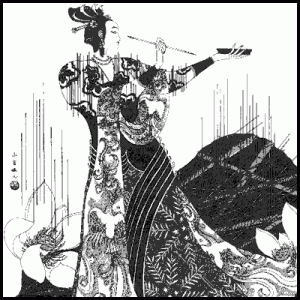
During the Tang Dynasty, there were several women who attained positions of extraordinary power such as Wuzhao (who usurped the throne and reigned from AD 684-705) and ruled over all China. There was also a female prime minister, in deed if not in name; for although Shangguan Wan’er was never given the official title, she certainly held authority of that office.
Shangguan Wan’er was the granddaughter of Shangguan Yi, a famous poet of the Early Tang. Shangguan Yi was opposed to Empress Wu’s political ambitions and consequently found himself accused of taking part in a conspiracy against the state for which he was put to death. Shangguan Wan’er’s father was executed for a similar crime but his daughter not only escaped being implicated but eventually came to hold an important position in Empress Wu’s court.
Shangguan Wan’er was clever beyond her years, discerning and manipulative; qualities which found favour with the empress who saw in the young girl something of herself. She was summoned to the court and given the title Jieyu, a title befitting a high- ranking concubine. Soon the empress made use of her not only to write imperial edicts, but also to spy on her courtiers. Shangguan Wan’er devoted herself single-mindedly to Empress Wu and, as a result, became more and more powerful.
When Tang Emperor Zhongzong ascended to the throne, Shangguan Wan’er was awarded the title Zhaorong and was responsible for the imperial harem. Later, she became the favourite of Empress Wu’s nephew, Wu Sansi. Empress Wu grew increasingly fond of Shangguan Wan’er so when she came to rule in her own right as Empress Zetian, Shangguan Wan’er was always by her side; dealing with matters of vital importance on the government and state. During this time, she shouldered all the responsibilities of a prime minister without the actual title.
When Empress Wu abdicated and her son Zhongzong was restored to the throne, Shangguan Wan’er no longer had the right to participate in government affairs. Dissatisfied with her predicament, she consulted Emperor Zhongzong who allowed her to retain her title as Zhaorong, and took charge of the harem. Empress Wei, aspiring to follow in the footsteps of Empress Wu, poisoned Emperor Zhongzong. Shangguan Wan’er then sought Empress Wei’s patronage. The new empress enjoyed power for only a short time and was put to death when Li Longji, Prince of Linzi, stormed the palace. As a member of Empress Wei’s clique, Shangguan Wan’er was also killed.
Shangguan Wan’er was known for her deep understanding of literature and for being both a peer and an astute critic of poetry. Whenever Emperor Zhongzong was presented with poems during banquets in praise of Confucian scholars, he would call upon her to determine which ones were superior. As a result of this, she found a place in China’s literary history. However, her own poems were somewhat frivolous and flowery.
Qianniang
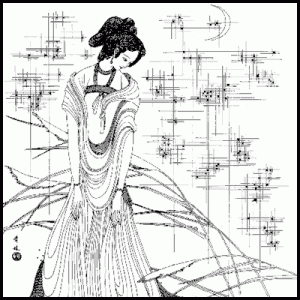
Among the fictional stories of the Tang Dynasty is one called The Departed Soul. The central character of this story is Qianniang.
In the third year of the Tianshou reign of the Tang Dynasty, an official from Qinghe named Zhang Yi took up residence in Hengzhou. Although Zhang Yi had two daughters, the elder child had died when she was still very young. The second daughter was a pretty girl and he named her Qianniang.
Wang Zhou, Zhang Yi’s nephew had lived with the Zhang family from an early age and was Qianniang’s playmate. Intelligent and handsome, Wangzhou was his uncle’s favourite who often joked that, when the boy grew up, he would like to have him for a son-in-law.
By the time Wang Zhou and Qianniang reached adulthood, they were deeply in love. Zhang Yi, unaware of their affection and forgetting the promise he had made when they were young, betrothed his daughter to another suitor. When Qianniang heard the news, she was inconsolable, crying day and night. When Wang Zhou learned of the betrothal, he too, was grief-stricken and was determined to leave his uncle’s house.
On the pretext of going to the capital, Wang Zhou bought passage on a ship to take him as far away as he could. The night before he was due to sail, he stayed on board the boat, his mind so full of thoughts of Qianniang that he was unable to sleep. In the middle of the night, Qianniang appeared suddenly, barefooted and dressed only in her house robes. She told Wang Zhou: “I have run away, I shall follow you to the ends of the earth!”
Wang Zhou was overwhelmed with joy and gladly took her away with him.
They went to Sichuan where they lived for five years and had two children. During this time, they had no contact with Zhang Yi. Qianniang felt guilty about abandoning her father and longed for her old home. Homesick, her eyes would often fill with tears. Seeing her distress, Wang Zhou decided to take her back to Hengzhou by boat.
When they arrived, Qianniang stayed on board while Wang Zhou went alone to her father’s house to offer his apologies. Having heard his nephew’s plea, Zhang Yi was very surprised and exclaimed: “These last five years, Qianniang has never left this house. She has been ill all this while and is now lying unconscious in her room!”
Then he hurriedly ordered his servants to go to the boat and find out the truth. Sure enough, Qianniang was seated there. Seeing the familiar faces of her servants, she enquired: “Is my father well?” The servants rushed back to their master in trepidation.
Suddenly, the Qianniang who had lain unconscious in her room woke up. She dressed and then stepped out with a smile on her face to greet the Qianniang who was at the river bank. The two women were identical. Everyone looked on in wonder as they happily embraced each other, their bodies merging into one.
Although this is a fictional story, historical records do mention a girl named Qianniang. Could she be a real person? According to Chen Xuanyou, author of The Departed Soul, he was able to research and verify her existence.
Yang Guifei
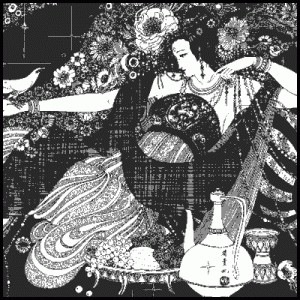
“Appreciating feminine charms,
The Han emperor sought a great beauty.
Throughout his empire he searched
For many years without success.
Then a daughter of the Yang family
Matured to womanhood.
Since she was secluded in her chamber,
None outside had seen her.”
Yang Yuhuan, later to become Yang Guifei (AD 713-756), was the daughter of Yang Xuanyan, a census official in Sichuan.
An only child who lost her father early in life, Yang Yuhuan was raised in the household of her uncle, Yang Xuangui. She grew up to be one of the few women whose beauty has caused the downfall of monarchs and nations.
“Yet with such beauty bestowed by fate,
How could she remain unknown!
One day she was chosen
To attend to the emperor.
Glancing back and smiling,
She revealed a hundred charms.
All the powdered ladies of the six palaces
At once seemed dull and colourless.
One cold spring day she was ordered
To bathe in the Huaqing Palace baths.
The warm water slipped down
Her glistening jade-like body.
When her maids helped her rise,
She looked so frail and lovely,
Immediately winning the emperor’s favour.”
In the twenty-second year of the Kaiyuan reign, Yang Yuhuan was chosen to enter the imperial harem. In the twenty-eighth year, the Tang Emperor Xuanzong summoned her to the Huaqing Palace where she first rose to imperial favour.
“Her hair like a cloud,
Her face like a flower,
A gold hair-pin adorning her tresses.
Behind the warm lotus-flower curtain,
They took their pleasures in the spring night.
Regretting only the spring nights were too short;
Rising only when the sun was high;
He stopped attending court sessions
In the early morning.
Constantly she amused and feasted with him,
Accompanying him on his spring outings,
Spending all the nights with him.
Though many beauties were in the palace,
More than three thousand of them,
All his favours were centered on her.”
Her relatives gained unprecedented influence: her uncle, Xuangui, was made a senior official in the capital; her cousin Yang Guozhong was appointed prime minister; her elder brother, Yangxian became an official of the second rank while her younger brother, Yangqi was given an imperial consort as his wife. Her sisters were all appointed to nobility.
“The Rainbow and Feather Garments Dance
Was stopped by the sounds of war.
Dust filled the high-towered capital,
As thousands of carriages and horsemen
Fled to the south-west.”
Emperor Xuanzong, wallowing in the pleasures of the flesh, neglected his court and politics. In AD 755, An Lushan, a powerful general, seized the opportunity to stage a rebellion and marched into the capital. Emperor Xuanzong fled towards the south- west, taking Yang Guifei with him.
“The emperor’s green-canopied carriage
Was forced to halt,
Having left the west city gate
More than a hundred li.
There was nothing the emperor could do,
At the army’s refusal to proceed.
So she with the moth-like eyebrows
Was killed before his horses.
Her floral-patterned gilded box
Fell to the ground, abandoned and unwanted,
Like her jade hair-pin
With the gold sparrow and green feathers.”
They had not gone far from the capital when the soldiers refused to go on, demanding the death of Yang Guifei. Emperor Xuanzong had no choice but to watch Yang Guifei kill herself at the slopes of Mawei village.
Like the soldiers, the common people hated Yang Guifei, believing that she had brought harm to their country. In reality, she was no more than the plaything of a fatuous monarch, used as an excuse by treacherous subjects to justify sedition. Perhaps those who truly deserve to be despised are the self-indulgent emperor, his traitorous subjects, and fair-weather friends who used claims of kinship to gain power. Beyond that, the blame must lie with the backward system of feudal autocracy under which Yang Guifei lived.
“Heaven and earth may not last for ever,
But this sorrow is eternal.”
Meifei
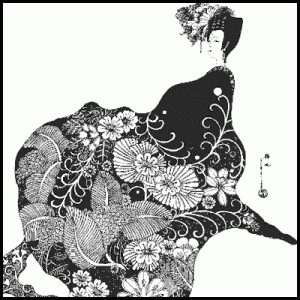
Meifei, which means Plum Concubine, was originally named Jiang Caiping. She is also known as Concubine Jiang. She came from Putian in Fujian and was the daughter of a doctor. Her father was on good terms with several palace eunuchs and, because of this, his daughter was chosen to enter the imperial harem where she soon won the affection of Emperor Xuanzong of the Tang Dynasty. Her love for plum blossoms prompted the planting of many plum trees within the palace grounds as well as the construction of a Plum Pavilion. The emperor named her Plum Concubine.
Delicate and gentle, Meifei was not given to jealous bickering and so, was very popular with the other palace ladies. When Yang Guifei entered the harem, the emperor no longer favored Meifei and had her moved to the southern palace. Living the loneliest of lives, Meifei filled her days by studying poetry composition, calligraphy and painting.
When Emperor Xuanzong sent her a gift, a box of pearls given to him as a tribute from the barbarous state of Di, Meifei received them with indifference and sent a reply in the form of a poem:
“Like laurel leaves, two eyebrows unpainted,
Red silk stained with the remnants of makeup and tears.
At Chang’an gate there is no need to rise early, wash and dress.
How then can pearls comfort me in my solitude?”
When An Lushan led his rebellion in AD 755, Emperor Xuanzong took Yang Guifei with him and fled towards west Sichuan, leaving Meifei behind. Yang Guifei was killed by the slopes of Mawei village, but the fate of Meifei was unknown.
When peace was restored, Emperor Xuanzong abdicated in favour of his son Suzong. As the ‘Taishang huang’, all that Xuanzong was left with were his memories. Unable to bear the loneliness of his new life, Xuanzong ordered that a thorough search be made for Meifei, but to no avail. Then he commanded an artist to paint Meifei’s likeness. When the work was finished, he added a verse himself:
“Treasure this fragile beauty who once served the purple throne,
Leadened, grey and weary, I seek her artless innocence,
Painted and clothed, she seems as lovely as before,
But her bright eyes regard me without their former sparkle.”
He ordered his servants to show this likeness everywhere but there was still no news. Then, one summer day, Meifei came to Xuanzong in a dream. She stood beside his bed, weeping and said: “I was murdered by rebel soldiers at Lishan and I sleep beneath the plum tree, east of the pool.
Xuanzong woke up with a start. He immediately dispatched servants to dig up the earth beneath the plum tree. There they found the body of Meifei, wrapped in fine brocade, looking just as she was when alive.
Madam Willow
Gongsun Daniang
Li Wa
Hongxian
Yingying and Hongniang
Du Qiuniang
Xue Tao
Yu Xuanji
Guan Panpan
Jiao Guiying
Nie Yinniang
Tan Wenwan
Han Cuipin
She Saihua
Mu Guiying
Mother Yue
Liang Hongyu
Su Xiaomei
Li Qingzhao
Zhu Shuzhen
Sun Daoxuan
Chen Ruolan
Shentu Xiguang
Huang Daopo
Empress Qi
Empress Ma
Du Shiniang
Li Xiangjun
Chen Yuanyuan
Eighth Madam
Qin Liangyu
Xiangfei
Wu Zao
Wang Cong’er
Zhou Xiuying
Lin Hei’er
Hong Xuanjiao
Zhenfei
Sai Jinhua
Qiujin
Other data
This information has been recovered on Archive.org from the web: http://www.span.com.au:80/100women/ disappeared in the year 2002/3.
